
Christine Cheung
Q: Can you share your experience as a Data Intern with the Society of St. Andrew (SoSA) this summer? What were some key takeaways from your internship?
Christine: Absolutely! My internship with SoSA, under the guidance of Tennessee Regional Director Jeannie Hunter and Professor Andrew Dillon, was an incredible experience. Over June and July, I focused on analyzing their gleaning and distribution records to uncover trends over time and by region.
One of the highlights was cleaning up their extensive datasets and creating an interactive map to visualize food distribution activity alongside publicly available data on acreage and food insecurity levels. This project not only helped illuminate SoSA’s efforts over the past decade but also played a critical role in grant writing and fundraising, which are essential for non-profits.
Additionally, we began organizing datasets for econometric research to evaluate the impact of SoSA’s work on food insecurity rates in areas with high activity. It was exciting to think about how our findings could directly support the organization's mission.
Although the position was remote, I had the chance to visit their office in Lynchburg, Virginia, which added a personal touch to my experience. Meeting the staff and discussing their work with Executive Director Lynette Johnson and Virginia Program Coordinator Ben Breene helped me connect the data to real-world applications.
Overall, I came away with a stronger understanding of how data can inform social impact initiatives. This experience not only honed my technical skills—R programming has become my best friend—but also deepened my appreciation for the role of non-profits in addressing systemic issues like hunger. I'm really grateful to the Economics Career Office for this opportunity and excited to apply what I’ve learned to future projects! P.S., Professor Andrew Dillon graduated from UVA's Department of Economics in 1999 with a BA in Economics and PST. He then completed his PhD at Cornell in Applied Economics. https://www.linkedin.com/in/andrew-dillon-a5a671114/

Varun Rastogi
At the time of this interview, Varun worked as a Managing Director for Investment Banking at Goldman Sachs. Prior, Varun worked as a Trader for Louis Dreyfus, a Manager at ICICI Bank, and an Executive Director of Investment Banking at JP Morgan.
Where do you work (or where have you worked) and what is (or was) your position? Tell us a little bit about your career path or intended career path.
I work at Goldman Sachs in Investment Banking; I am a Managing Director. I did my MBA from UVA, Darden Business school. I did both undergrad and graduate studies in India, after which I worked for a few years, before coming to the U.S. and UVA.
I did my summer internship in investment banking at J.P. Morgan coming out of Darden back in 2006, joined them as a full-time associate in 2007, was there for 11 years, and moved to Goldman Sachs four years ago. My focus throughout my career has been on debt capital markets. I lead our media and telecom leveraged finance practice.
What does (or did) your position entail? What, essentially, do you do on a daily basis?
As is very typical for investment banking (and hopefully this helps most of the students who are looking at this), investment banking largely has three components. So, I’ll try to keep it simple for people who don’t know what investment banking is.
One part of it is M&A advisory. You’re primarily trying to advise a company on strategic and financial matters: what sources of cash and capital they have access to, how to sell their company or an asset within their company, how to structure buying a company (and even what assets to buy), shareholder advisory and activism. So that’s the advisory part of it.
The second bucket is raising capital. Whether it is in the form of equity or debt, you are trying to solve for getting the company or financial sponsors cash to do things. Companies need capital for refinancing existing debt that is maturing, making capital expenditures, acquisitions, paying dividends etc. The financial sponsors need to raise capital for acquiring companies (e.g., LBOs), etc. The first time a company raises equity via a listing on an exchange is an IPO, which Im sure most people have heard of. The process to issue debt for the first time has many similar steps to an IPO including working to prepare the company and frame the story to investors.
The third thing I would say is, when you think about investment banking in general, there are some now unique solutions you provide. For example, derivative services, transaction banking services – which means making global payments more seamless, liability management which means helping a company buy back debt or equity in a cheaper, smarter form. There is a lot more to this bucket than I’ve listed.
What I do is a bit of all three buckets for anything related to debt. I am in leveraged finance, which basically means I advise companies that are non-investment grade, which includes strong companies which have relatively more debt, or are in growth phase or just been acquired by financial sponsors. It’s a huge pool of companies like T-Mobile, Twitter. At some point, not in distant past, Netflix and Dell were also non-investment grade.
I work with companies in the TMT space, which is Media, Telecom, and Technology space. So I advise CEOs and CFOs on how to structure debt and distill key selling points, and then we help those companies, who are looking to raise capital, by connecting them with debt investors looking to invest capital. We’ll help the company present their business/financial trajectory to investors, after which we negotiate with the investor base on behalf of the company to achieve the best terms possible.
We also underwrite debt, which basically means we make a commitment to the sponsor or company that we will raise debt capital at certain pre-agreed terms thereby capping the market risk for any M&A, including LBO, or other financings for companies and sponsors by using banks own balance sheet.
What did you study during your time at UVA?
It was a full two-year MBA program. In my MBA, my concentration was finance; it was largely finance and a little bit of general management and a little bit of marketing. But it was all encompassed as part of the MBA program. I lived in Charlottesville for two years and loved it. We still go back couple of times a year.
When and how did you know you were interested in pursuing a career in investment banking?
Great question. So when I did my undergrad and graduate studies in India, I was working there as a commodities trader, and somebody said, “hey why don’t you join us and become a corporate banker”. And so I did. I was working at one of the big banks in India at the time, and I soon realized that corporate banking jobs are very interesting, but I wanted to get into more of an advisory role and become a consultant to the company on its capital structure. For that, I needed to move into investment banking. That’s why I joined Darden.
Now of course if you think about Darden or UVA or the Darden business school MBA, you will realize that it is not truly a finance school. Darden prides itself on being a more general management school, and now it’s becoming more of a consulting school so now if you look at the population that goes into consulting and general management, it far exceeds the population going into finance. But what I’d heard about the case study method, what I’d heard about small classes, what I’d heard about the relationship that Darden has with Wall Street, those were the reasons why I chose Darden.
Are there any particular internship positions you would recommend as good preparation for a career as an investment banker?
I think the interesting thing about investment banking internships is, the sooner you take a summer internship, the better as those most of the times leads into a summer internship for the following year and then into a full-time job. If you want to do investment banking, there are avenues open to you to start early, maybe in your sophomore year as a summer intern, then junior year, and then come back full-time. But if your question is specific, like hey if I don’t know if I want to do investment banking but I want to do something else or I want to keep my doors open to get into investment banking, then I do think there are a lot of jobs. At the end of the day, one part of investment banking is finance knowledge but other part of it, depending on what your interests are, can be in product knowledge, as well as in industry knowledge. So if you want to try something of that sort and get into investment banking later, that’d be better. I tend to see people who know they want to get into investment banking try to do it sooner rather than later. But there is no hard and fast rule like you need to do x, y, and z to get there. At the core of investment banking is sound judgement and problem-solving skills, so in recent years many investment banks have recruited from various specialties (not just finance or economics) e.g. math, philosophy, history, etc. so you don’t necessarily need to start in investment banking to be successful.
I do think, by the way, from a technical skills perspective, I have always found UVA kids to be at par with best of the best in terms of technical skills. Because you are selected amongst best-of-the-best to get into UVA, you already have that threshold intelligence that is needed to do this job. And the rest of the technical skills are taught to you in the classrooms by one of the best professors. So I don’t think you need a specific technical knowledge or a book knowledge to be in investment banking. I think you get that from attending the right classes, and you have the opportunity to attend a bunch of classes – like you have a lot of finance classes and econ classes to be able to do it. And two years later, if you want to be hardcore, you can always join McIntire. You don’t even need to join McIntire, and by the way there are a lot of UVA students who are in investment banking who didn’t go to McIntire, who stayed in the College of Arts and Sciences.
Do you recommend attending graduate school? If you did attend graduate school, was it a useful experience? If you did not, do you wish you had?
I’ll give you a very cliché answer: it’s a matter of personal choice. I can tell you the reason why I did it but everyone needs to find their own reason. Part of it is I had a necessity to do it because I was based in India, and while I was working at a large Indian commercial bank, it was still an Indian bank in India. And it was more than 15 years ago! If I wanted to be in Wall Street back then, there was not a natural progression to get there from that position. It would have taken years to get there and so Darden MBA significantly accelerated my path.
And so the benefit of graduate school in that sense, just to elaborate more, is if you are a career switcher, if you want to switch your career (you’ve done something, now you want to switch your career; if you were an investment banker, and now you want to be a consultant or you want to join general management or you want to go into private equity or you want to go into venture capital), graduate school allows you an opportunity to switch your career and get there. But that’s a need kind of thing, not a want kind of thing. Like, you need to go there if you want to switch your career so you go to graduate school and it helps you.
But putting my specific circumstance aside, I do think graduate school expands your horizon from multiple perspectives.
Firstly, you get to learn a range of topics such as marketing, of course finance, but also math, organizational behavior, business strategy, accounting, and consulting. You see multiple aspects of doing business and that opens your horizon.
The second way it opens your horizon, and I think Darden does a really great job of that, is it brings in a very diverse class – not diversity only with respect to somebody’s religion, gender, race or geography, but also diversity of thoughts, diversity of their jobs, diversity of where they are in career cycle, and everything else. And when you put all those people together in a classroom, what you find is those classroom discussions become really, helpful for you, to understand somebody else’s perspective.
Growing up in India, I thought I was good in math, so my problem was somebody gives me a question and I immediately go and answer it; I thought there was only one way to answer it and there was always one right answer. Darden taught me lot of times, there is not one right answer. You’ll find a lot of people who come from a very different background, maybe teachers for example. They approach the same problem in different way, and still make get to the same answer, which was good to see, because that, opens your mind to interesting thoughts, perspectives, and ideas.
What parts of the investment banking industry do you see as being trend-setters and what parts do you see as being increasingly less relevant? In other words, what trends have you observed?
Wow, you did throw a curveball. You kind of threw soft ones until now and threw a curveball. Look, I’ll say, if I am in your spot or if I am in a position where students are at UVA trying to determine whether the industry is going to survive in five, ten years or not, I think it’s a very hard judgement for anybody to make today. There will always be legacy businesses and there will always be disruptors. It has happened time and again. Think about time when people used magnetic tape and walkmans and when music became digital, suddenly no one was using those things anymore. But that does not mean that the music producers did not have anything because the medium changed; Lot oof music companies upgraded their technology to be with the times and be relevant. So, I do think that any field will always have disruptors but there will always be a way of evolving ourselves to find our career goals. Some of the fields will wither away. But, at end of the day, people will retool themselves and find a way forward.
Right now it’s easy to say, I want to be in tech industry as its cutting-edge and as Technology as that will disrupt everything. But tech is such a broad industry. There are multiple aspects of tech that are there; there are people in hardware, there are people in software, people are in fintech, people are in internet digital media. Good thing is that all are adding value to the broader ecosystem. Same way with investment banking. Yes, investment banking will probably not stay in the current shape or form five, ten years down the line. It will go through an evolution, but that evolution does not mean that you will be left without a job. I think that evolution means that you will have a place, it’ll just look slightly different than what it does today.
Given that these careers are often very demanding, what is lifestyle like? How do you balance personal and professional life?
Great question, and that’s an ongoing debate always. Look, I would say that investment banking has done a phenomenal job on work-life balance compared to 20 years ago. There is a lot more work-life balance, there is a lot more ability for people who have personal time, there are banks like ours which say you can’t work starting from Friday night till Sunday morning. More often than not, you have protected weekends. And senior people generally tend to be cautious of not giving anybody work over the weekend unless it is super urgent. That movement and progression has created a lot of positive.
But I would say that investment banking jobs tend to be demanding, but any job can be demanding. In other jobs, it may come in a longer sine curve or a longer cycle. For investment banking jobs it is very quick. And the reason for that is we try to do a lot more with less time. The transactions that our clients are doing are game-changing transactions for them. So, for example, if you want to raise equity, you want to raise debt, you want to sell your company, you want to buy a company – these are not everyday activities for a company but are very critical for every company. And to make them happen, the timeline tends to be compressed as there can be a lot of risk that can sweep in. Lot of times these transactions fallaway if the timeline is longer.
So, from that vantage point, yes, an investment banking job will be challenging, and it will always be challenging because we must meet tight timelines. Now people do a good job in these environments to still provide some work-life balance, and that balance will also improve as you become more experienced in your role (versus in your first year on the job, every process, system and direction is new).
Any other advice or recommendations?
My three recommendations for every person who is thinking about investment banking is:
First: Talk to as many people as you can in an investment bank before you make this a career. It helps in you getting recruited, of course, but it also helps you understand what the investment banking job entails. Getting surprised is never a good thing for any job.
Second: When you are meeting people in investment banks for interviews, you’re going to find a lot of questions are technical. I would recommend taking one of those breaking into Wall St courses on (for example, to learn valuation methods). Ultimately, what we (as interviewers) and you (as potential employees) should be trying to figure out is if the other person is a thoughtful person who is good to be around, and wont capitulate under pressure. So, dig into yourself to understand what the behavioral questions are and be prepared to answer them, as well as understand what you need from a banking perspective.
The third thing I will say is, make sure, when bank events come up on your campus, attend! See different banks, because that will also give you an idea of the personality of each and every bank, what they do, what they do differently, what they are doing great. Additionally, go attend career fairs for other industries so you have more comfort on which career and lifestyle path is right for you.
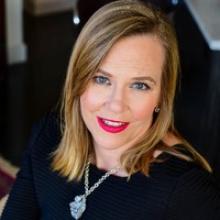
Gretchen Tibbits
Where do you work (or where have you worked) and what is (or was) your position? Tell us a little bit about your career path or intended career path.
I was in the College, and I actually was an Echols Scholar. I don’t know if you still call it this but at the time we called it “Echoling Out” so I have a pure Bachelor of Arts degree. I graduated (I don’t like to admit this) in 1989, so a long time ago. I have been in New York ever since. I did get an MBA in finance and management at night at NYU. I’m not sure that an MBA is [as] necessary now as it was for me at the time, but it certainly is valuable having made this career switch as a banker. People are skeptical when they hear I was an operator and then “oh, okay you have an MBA in finance from NYU, you do have some more traditional credentials”. And I ran, built, and transacted media companies as an operator for a couple decades and then in 2019 moved over and initially joined a small boutique bank, where I did 12 transactions in 20 months there (which is a significant volume). I joined DC Advisory December of last year with the thought that it’s a more established, definitively middle market bank, which I liked. It’s not huge and there’s a lot of focus on culture in a positive way, but you’ve got enough people that you have full teams on projects which was important to me to be able to provide that level of service to my clients. And the other thing that I really liked about DC Advisory is we truly are an international firm. The last thing I did before jumping on this call was working with a gentleman named Satoshi who is part of our Asia Access Team on a presentation we’re going to give to a Japanese company next week - we truly are working cross-border. I focus on media, but I think this is true across most industries; you really need to be cross-border and have an international perspective for business today.
What does (or did) your position entail? What, essentially, do you do on a daily basis?
Well I think for me (and I’ll be really brief) a big chunk of what I am doing is business development and being out there. Being present, knowing what’s going on, knowing where the opportunities are. For me, you should always be looking at how do you put deals together for your current clients but also who is going to be your client list next year, who is going to be my client three years from now. And it might be even more important who is going to be my client three years from now.
When and how did you know you were interested in pursuing a career in investment banking?
Well, it kind of pursued me. Mine is a funny story because I got a call saying “your old company is going to be for sale again, why don’t you come help us pitch for the business and if we get the engagement, you get to sell your old company again and see if you like being a banker?” That is not a typical story on any level, but that’s how I became a banker. I realized that I was accustomed to much of what you need to do to succeed as a banker. Because I’d been building businesses and asking questions like what should we buy or what part of this company should we sell - even doing cap raises as an operator. As a banker, you are either helping people buy more companies, sell their company, or raise money to grow their company. I have done it, all three, but on the other side.
How do you recommend preparing for a career in investment banking during your undergraduate years?
There definitely is, as part of the interview process, technical questions [that are] analytical in how you approach [them]. When I talk to people, I’m much more judging intellectual curiosity, the ability to be a self-starter, to know when to ask for help but also to be self sufficient. So the intellectual curiosity and, to me, any leadership that you have shown on Grounds (through organizations, sports, community service, whatever it may be); these are important to me because it shows a more well-rounded individual which I have a bias towards – as does UVA.
Do you recommend attending graduate school? If you did attend graduate school, was it a useful experience? If you did not, do you wish you had?
Well I talked about it a little bit. I think, for me, I was just a couple years out of school and had advanced pretty quickly. I was [picking up] on a lot of perception that I shouldn’t have a seat at the table, once it was literally said to me. I felt that I needed that additional credential. I went at night, [which is] not something I would necessarily recommend, because I do think that if you go back to business school, part of the experience for people that I know have had a great experience, is that class cohort - the comradery and the network that you build there. And as a night student, that’s just not how it’s structured or how it worked (no offense to NYU). I do think [it could be useful] if you’re making a career shift. So say you come out of UVA and you do Teach for America for 2 years, or the Peace Corps, or the like and then you say, that’s been great, but now I want to be a banker or a consultant. Then, getting an MBA is very valuable and it opens the doors that would be very difficult for you [to open] making a shift like that. If you have a banking job, and you want a change, I’m not sure that the path Haider took isn’t better – where you go into private equity or VC or something similar for a couple of years and then decide you want to come back.
Given that these careers are often very demanding, what is lifestyle like? How do you balance personal and professional life?
I do think one of the positives of COVID (and there are not a lot) is it has taught us all how to adapt more to working wherever. I have not made a secret of this, my mother has been very ill this year. I talked to two of the senior people; I asked, would it be okay if I worked from Florida for a period of time? And the response was “If you need to be in Florida, be in Florida” – and it wasn’t flippant. We have all figured out that, while there is a benefit of being able to be together and in person, you don’t have to be sitting at a desk all day, every day to be effective. I think we work very hard to have this be a hybrid environment but when you have to be here, you’re here.
Any other advice or recommendations?
One [piece of advice is] just to be thoughtful when you’re talking to firms and to pick up as much as possible [about] the culture, the team dynamic. Particularly if you’re at an information session or you’re at an interview where there’s a couple people, watch how they’re interacting with each other. The second is just enjoy your time at UVA and make sure you are not so focused on what that internship and what that job is afterwards, that you miss the experience. I’m biased, we’re both biased, as we’re both very involved as alums. And most of my best friends are on a 15-person text chain and we were all undergrad together, all these years later we know each other’s kids and our parents and what’s going on in each other’s lives. Don’t get so focused on [how] you have to have the perfect internship that you miss out on all of that, because that is part of what makes UVA extraordinary. And don’t think that the student self-governance and the intellectual curiosity and the diversity of thought and opportunity is something that you’re going to get every place else you are in your life because it is extraordinary.

Ryan Brown
Currently, Ryan serves as an M&A Analyst at AlpineX Group but at the time of the interview he was an Investment Banking Analyst at Parella Weinberg Partners.
Where do you work (or where have you worked) and what is (or was) your position? Tell us a little bit about your career path or intended career path.
I currently work at Perella Weinberg Partners. We’re an independent advisory boutique investment bank, specifically focused on mergers and acquisitions and financial restructuring. I guess where we fall on the spectrum relative to other banks people think about – so you think of your large household name banks, Goldman Sachs and Morgan Stanley’s of the world, they kind of do everything, from financing to other products like M&A. We specifically focus on a couple specific products that don’t rely on your company having a large balance sheet.
And then, a little bit about my career path, I’ve kind of always done finance stuff. In college, I did a couple of other finance-type internships (one actually was with the place I currently work), but I also worked for a smaller financial restructuring shop actually with a UVA alum. And then even before that I was working for a small industrial-focused VC which actually kind of compared pretty well to what I’m doing now. Because I work in our industrials M&A team here, I focus a lot on businesses in the infrastructure space, chemicals, building products, and timber, paper, and packaging – things like that. And I guess going forward with my career path, I see myself staying in finance at least for a few more years. I think it’s a really great place to build skills, especially for a first job. Every day I feel like I’m learning something new, whether it’s in terms of actual things I’m doing on my job, whether it’s data analysis or having a better understanding of company business models or things like that. And you also, I think, which is a little underrated kind of, really just come up to speed with being an adult and handling this very professional life very quickly. I think there is a major dichotomy between where you are when you’re in college, where you have a lot of free time, to working a job where I feel like there is a lot of structure. But I think [it’s] in a good way, where you just become really good at how to manage being professional – I don’t think I really understood that until I started this job.
What does (or did) your position entail? What, essentially, do you do on a daily basis?
I think that’s actually a great question because I think people hear the words investment banking and [it’s] in some ways a really catch-all. I know people that are also technically in seats that are considered investment banking and we do incredibly, incredibly different things. So, I mentioned before, I am in our industrials M&A team, so we focus specifically on a handful of different verticals within industrials. If we’re working on something live, like a live deal, generally that’s a lot of process-oriented work. So I’ll be building financial models, I’ll be doing a bunch of different types of valuation methodologies. So there are, for example, a couple that are more intrinsic to the company itself. You might be building a discounted cash flow model or things where it’s like a relative valuation based on previous transactions that have been done in the industry or against peer companies that we’re trying to value. And I think a lot of the job too, especially when you’re not working on something that’s live, is a lot of business development and just trying to understand the space that you cover. So like we’ll do a lot of work where, I would argue, it’s more qualitative and we’re trying to build themes. So for example I work a lot with our partner focused on aerospace and defense and I am working on a couple of, I guess I would call them broad marketing materials, where he’ll go on a roadshow essentially – and working on, alright, here’s all the things going on in the defense and contracting space. And kind of trying to pair these in a way where we can drum up future business opportunities with these companies. So I think it’s multifaceted in the sense of like, yes when you are working on live things, it’s a little more what I think people think of when they think of investment banking, but also you’re supporting a future pipeline of work that you’re trying to acquire in the future as well.
What did you study during your time at UVA?
At UVA, I was an Econ and Comm major, so double. It’s actually funny, I actually didn’t come in thinking I was going to do finance. I mean, I did have an interest in that stuff from the get-go. But it was more like I came in thinking I was going to be an engineer, and I joined a couple of finance-related clubs, including the McIntire Investment Institute my first semester. So it’s definitely something where I was like, alright, I like finance and maybe it would be more of just a good skill to have. I think everyone can really benefit from having a good understanding of money and things of that nature. But then I actually (I forget exactly [when], it was during my second semester) just [realized] I was enjoying those things way more than I was enjoying my engineering classes. For better or for worse, I ended up switching gears. I was Econ and Comm, and I think for a lot of people that’s like, “oh, I’m a Comm student and I just finished some of my extra Econ classes”. I would definitely say I was an Econ student before I was a Comm student. Where my interests really [lay] within that spectrum was, I was super interested in economic history, so Mark Thomas was a professor I really liked to take classes with. And I think what finance really was was just a way to have a practical application of that, you know, to kind of turn it into something you could have as a career without sticking in more of an academia track, because that wasn’t something I really wanted to do.
When and how did you know you were interested in pursuing a career in investment banking?
I would say that even today I wouldn’t even be like, “oh investment banking is the thing forever for me”. I just think investment banking is really great because it’s an avenue where there is a very structured path for new grads to come into it. Actually some of my best friends from UVA are doing other things in the finance space, whether it be private equity, venture capital, or things like that. And not to say that those are not great opportunities to also learn, but I think I came in looking at this job as, okay, here’s a chance to learn a lot of stuff in a very short amount of time. And then if you like it you can of course stick with it – but I guess that was my basic premise. And investment banking is a way to get your foothold into the industry that has been pretty tried and true for the greater part of the last half of the century. So I think there is a value in there being a real track record of like, you know, we have a big cohort that comes in and we have a very structured way to teach you all these different skills. So I think that was something that really appealed to me. But I guess specifically when I decided I knew I wanted to do that [was] when I was working for the UVA alum who had this small restructuring shop in DC. I really enjoyed that experience. It was him and a couple other senior more operating guys. For anyone listening to this, [restructuring] is a lot of working with companies that are in stress, [but] not necessarily in a Chapter 11, which is when a company is actually bankrupt. In the case of what I was doing that summer, it actually was with a bankruptcy. So the senior guys were all really operational focused, so then me and the other one or two UVA interns really got to handle all of the financial modeling and things like that. But it was just really cool having that level of opportunity to run with these things that I felt like I had been learning in these clubs and these classes. That was really intellectually stimulating; it was challenging but also it felt really rewarding to do it.
How do you recommend preparing for a career in investment banking during your undergraduate years?
At its core, actually people at my job say this all the time, investment banking is kind of like an apprentice-based career, at least for the first couple of years. I mean again, there is so much nuance that it’s just impossible to replicate [it] in the classroom or in a college environment. I would say the best way to prepare yourself in really getting down to brass tacks, is definitely trying to take relevant finance courses, trying to get a basic handle on different valuation methodologies. Even joining clubs that are focused on investing and things like that; they’re not like-for-like I guess with investment banking, because with investment banking you kind of take a different seat relative to the investor. But just building up skill sets of understanding companies, understanding industries is super helpful. I think one of the things that people really don’t get about investment banking – well I guess people understand that there’s rigor – but the rigor isn’t necessarily the most rigorous thing. Like, I would say there [were] things I did in school that were more difficult. It’s that you are put on a ton of projects all at the same time and it’s like, hey, we need you to do this thing and yeah, maybe in like a vacuum, you could do it in eight hours – but we need you to do it in three hours because you have all these other things going on. So it’s like, being good at it and also being able to do it with a big time crunch. So getting a good handle on these things that are applicable skills beforehand will allow you to come off that curve quicker and be able to be more efficient sooner.
Are there any particular internship positions you would recommend as good preparation for a career as an investment banker?
I can totally plug the company I work for, Perella Weinberg Partners. I think I had a really good internship experience last summer. So again we’re a boutique investment bank. We actually used to do MBA recruiting but now it’s pretty much only through our undergraduate pipeline unless you’re a pretty senior hire. Mainly we do recruiting for sophomores in the spring for their junior summer internship, which would be, I guess, 15 months after that. I definitely think that we have a bunch of good opportunities across a bunch of different industries. You don’t just have to be industrials or something, we have a ton of different verticals, we also have a restructuring team. I also worked for a small VC shop, it’s called New Stack Ventures in Chicago. I kind of mentioned it in passing earlier; they’re focused on a bunch of cool cutting-edge space stuff. I actually got connected to them through an older UVA student who I worked with then. Just opportunities in places like those; you can even make connections yourself. I know so many people that actually kind of just cold-called places and found opportunities and I think that’s a super possible avenue as well.
Do you recommend attending graduate school? If you did attend graduate school, was it a useful experience? If you did not, do you wish you had?
I would say, to preface my answer to this, I think I am not the best person [to answer this]. I’m a few months out of school, so just contextualize [my response] that way. I think graduate school can definitely be useful. For me, I don’t plan on going to graduate school but that can totally change. I think it’s really good, especially if you plan on switching career paths, whether it’s within finance or to another industry. I think it’s a way to communicate interest, like, hey I’m very seriously considering doing something else, this is why I went back to school. I think if you’re going to do something in your direct field and your company doesn’t explicitly require it, I don’t know if it’s necessarily the most cost efficient thing – because you have to factor in both the cost of tuition and the opportunity cost of the money you would be making in industry. But that’s not to say that it’s something you shouldn’t do. I think there’s value in just attending school, because learning and gaining knowledge is just something that is such a fun experience. I think undergrad was one of the best parts of my life – and, of course, on the social side as well. But I mean just in the core part of why you’re there, seeing classes and being a student, I think that was such an interesting and unique part of the experience. So I think, definitely if you have an interest in it, yes go for it, but in terms of how it relates to investment banking, I don’t think you necessarily need it.
What parts of the investment banking industry do you see as being trend-setters and what parts do you see as being increasingly less relevant? In other words, what trends have you observed?
Actually I think you can kind of cut that along two different ways. The first thing that pops into my head is on an industry basis, like what parts of the broader economy do we see as growing because investment banking kind of touches everything. Because at its core what we do is life-changing transactions for companies. Well I mean I guess investment banking generally, whether it’s on the financing side or on buying or selling other companies, spinning off divisions of your company. Because of that, investment banking kind of plays everywhere. So something that I think is a major gigatrend almost, because it’s huge in the economy broadly, it will be huge in investment banking. It’s this major energy transition; you see everywhere the net-zero 2050, all these different Paris Accords, all these things. But you’re actually starting to see that more in practice in terms of all of these climate-focused companies, climate-focused funds, things of that nature. Actually two of the people I work with just recently left my team within the last month, both going to different climate funds, focusing only on the companies involved in this climate revolution. So that’s something I definitely see as trend-setting over the next 10, 20, and 30 years. And I guess, on the flip side, what in the broader economy is becoming redundant, becoming less relevant. I would say some of the more traditional energy, whether it be oil or things like that. I mean I don’t think tomorrow that stuff is going to be defunct, but I definitely see things like that, that are just becoming less important and we’re trying to shift away from them.
But also cutting across the second thing I mentioned, I think it’s also important to look at it on a function basis. So like, what in investment banking is becoming more relevant, becoming less relevant. I think [about] some of the more trading seats [which] some people bucket in investment banking, some people don’t. The salesman trading stuff I think is becoming more and more automated with everything in AI, things of that nature. Like for example one of my really close cousins is here in Manhattan as well and he works on a trading desk. He just literally tells me it seems like everyday that something else becomes automated, something else becomes more and more outside the hands of the actual traders themselves. He totally sees – and I also see this myself in general – kind of a lot of jobs that will just, not necessarily be irrelevant, but just won’t be something that a human functions.
Given that these careers are often very demanding, what is lifestyle like? How do you balance personal and professional life?
I’m not one to come up with a fake answer. There’s definitely a lot of truth to that I would definitely say. I definitely work a ton, just to be upfront. I think a lot of it, though, depends on what you care about. I forget who said this, but someone that I was reading about recently said something along the lines of, you want to orient your life so that everything feels like play, no matter what you’re doing. And I enjoy what I’m doing, so, despite it being a lot of time, I don’t feel trapped in it I think the way some people do. I guess on the point of balancing personal and professional life, I think you actively have to advocate for yourself; no one will advocate for you. People will try and squeeze every ounce of your day if you give them the opportunity to. So it’s being very clear about, hey, I’m taking time to do this. Or, on the weekends, trying to unplug whenever possible. Because if you give them an inch, they’ll take a mile – it’s kind of like in any job I think, you know, people are always looking for more. But, again, you’re a human being first and an investment banker second when you’re in this job. So it’s definitely super important to focus on doing those basic things that I know some people definitely neglect. I work with some people that very much forgo a lot of their sleep, and I’m not saying you need eight hours everyday necessarily, but [they will] consistently limit themselves to four or five hours which I just personally don’t think is sustainable.
Any other advice or recommendations?
On an advice point, I just went through all of that stuff. I guess it was more sophomore year, when I was actually recruiting for jobs like this because it’s so crazy early and accelerated. I would just say don’t get caught up in a lot of the comparison stuff. Like if you’re considering a career in investment banking, make sure you’re considering it because that’s something you’re actually interested in. I feel like some people I knew were only doing it because they saw their peers were doing it, or thought, hey, this seems like something that people respect or something – I don’t even know really how to put that into words. But like, not because you’re genuinely interested in it. So I would definitely, if you’re considering a career or you’ve already made that career choice, just make sure that the reason you’re orienting yourself to this career path is for the right reasons – because the second you step into the workplace and you’re actually doing this job in your everyday, the actual work itself is what you’re doing, not this gilded idea that you might have created in your mind when you’re in school. Because it’s really easy, you recruit for this stuff when you’re a sophomore or junior in college and it’s easy to be like, oh yeah I got this internship or I got this job, now I don’t need to worry for the rest of college, and you just keep it in the back of your mind for two years. But you [will] actually step into the job eventually, so definitely make sure that’s something you want.
And I would also say, on the recommendation side, this industry is very early. There’s this weird first mover advantage – both on the company’s side and on the student’s side. So if possible, if you do know that this is something you want to do, preparing yourself as early as possible will make your life as easy as possible to break in. Like I know so many people that were juniors and seniors who were like, maybe I’d be interested in doing investment banking, and realizing that all of the opportunities kind of had already shut for first opportunities straight out of school. So, if you are a freshman or you are a sophomore, and you know that this is something you are interested in, maybe try and read a little bit more and make sure you understand that a lot of recruiting for junior summer internships happens when you are in your sophomore spring. I love all of the Econ and the Comm career stuff, but it felt like when I was going through all that stuff freshman and sophomore year, I wasn’t getting the correct information on timelines, and it was all kind of outdated – because if you think like 10 years ago, a lot of the recruiting would happen later, like maybe Junior fall or Junior spring for Junior summer. And that’s just really not the case anymore. Maybe there’s one or two places that will do that, but by and large, it is earlier. So make sure you’re asking peers, you’re kind of plugging into older people that have recently gone through the process, like juniors or seniors or fresh grads because that’s where you’re going to get the most updated information on how these things work. And again, I don’t blame any of the career centers or anything. These things change year-to-year so much that it’s impossible for them to keep up without having conversations like we’re having right now. So I would definitely say leverage older students [and] fresh grads because those are the people that [are] going to be able to really have a great handle on what [you] actually need to do, and when are actually these actual timelines, [and how to] best put yourself in a position to get a job like this if that’s what you want.
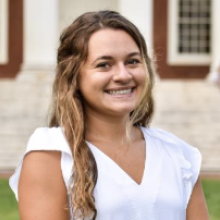
Ella Summer
Info TBD
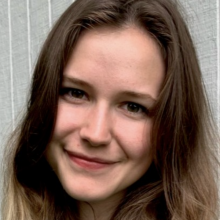
Eliza Haverstock
At the time of this interview, Eliza worked as Assitant Editor, Money & Markets at Forbes. Since, Eliza has worked as a Senior Reporter and Editor for The Org and now works as a Lead Writer on Student Loans for NerdWallet.
Eliza’s Story:
Eliza graduated from UVA in the spring of 2019. She majored in Economics and History. Her first introduction to business news was as an intern for Bloomberg. After graduation, she landed a job in Seattle at Pitchbook, a small tech news startup, where she covered startups, venture capital, private equity, and other finance topics. She has been working at Forbes for the past year as an Assistant Editor on the Money and Markets team. Her job duties involve editing content by freelance writers, fact checking stories for the magazine, and covering stories related to fintech and markets.
Where do you see yourself going next?
I’d like to stay in business news; it’s a cool place. With journalism in general, you get to talk to fascinating people; you get to talk to CEOs, investors, and entrepreneurs all the time. And as a journalist you get access to people like this that you wouldn’t normally get, and you’re always learning— every time I work on a story, I learn something new.
What attracts you to journalism?
I always really liked history and economics, which was why I ended up majoring in them, but I really enjoy writing and researching. I think econ gives you a good handling of quantitative and financial things that people respect. I was thinking of doing journalism for a while— I wrote for The Cav Daily— and then I decided to combine these two things: I’m really interested in business, but I didn’t see myself working in finance. So, that’s how I came to it— it’s a combination of a liberal arts degree, and something more financial or practical like econ. I’m doing a lot of creative things like writing, interviewing people all the time; I’m investigating things. But I’m not doing financial models all the time, I’m just talking about them.
What is a day in the life like for you at Forbes?
Every morning I’ll start by catching up on freelancer posts and editing them, and then I’ll work on longer-term projects. We do a lot of lists at Forbes like 30 under 30, and sometimes I’ll work on longer stories. As a younger reporter, I’ll sometimes be paired with a senior reporter on one of their big investigations, which can be really cool. And sometimes I’ll do a breaking news, or a quick story, if something comes up. I answer and send a lot of emails, and I interview people most days.
Was there someone you interviewed that you thought was really interesting?
Stephen Schwarzman, at my first job. He's the CEO of Blackstone, and he has something like $30B; so, that was a little intimidating. I interviewed the CEO of Playboy magazine; I interviewed a lot of startup CEOs. I interviewed a famous economist, Burton Malkiel. I remember I read his book in one of my econ classes. He wrote A Random Walk Down Wall Street. A few months ago, I interviewed UVA alum and Reddit founder Alexis Ohanian about his venture capital fund. It was a blast and he made a lot of UVA jokes.
Do you have any advice or tips for economics majors who want to pursue journalism? Is there anything you think they should be doing now?
I would say if you want to cover anything like business or anything financial, it's awesome that you're studying econ. It equips you with the tools to ask the right questions. I think it's important to get started in journalism in general to have what are called clips, which are writing samples— ideally articles. Writing for The Cav Daily is an awesome way to do that. I would write a couple articles a week, and that was great experience and practice, or even if you have an internship where you can write and publish something online.
I think asking a lot of questions is good. When I was trying to decide if business journalism was a good route for me, I went on LinkedIn and you can search alumni of your school, and you can search certain companies. I would sort it so I saw a UVA alum who worked at The Wall Street Journal, or who worked at Bloomberg or Forbes, and I would send them a message. People love to help young people who went to their school. I would ask them questions like 'what's a day in the life like?' Or 'what would you tell a younger version of yourself?' Just asking for career tips - those are great because it was a way to establish connections, and then they may remember you down the line, or you could reach out to them again later.
Do you have any tips for conducting interviews?
It’s definitely an art. Generally, you want to ask open-ended questions. Don't ask yes or no questions. Don't be afraid to ask the same question over again to get a better quote. Sometimes I'll talk to a financial expert that's talking in jargon the whole time because that's her life, and I'll ask 'Can you break that down in simple terms,' because you want to make things understandable to the reader, and it helps you learn too. And I always like to ask at the end of the interview, 'Is there any question you think I should've asked,' or 'Is there anything I should be paying attention to as a journalist?' I also work with great editors, and they’ll give me feedback and suggestions on interview questions.
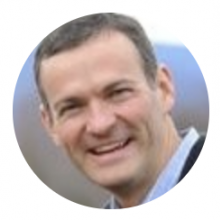
Blair Kelly
Blair’s Story:
Blair graduated from the University of Virginia in 1988 with a double major in Economics and Psychology. While unsure of what he wanted to do in college, he knew he “had an entrepreneurial spirit.”
Throughout his career, Blair has been involved in numerous successful business ventures:
Shortly after graduating, he started a business publication for Central Virginia with a friend, leading eventually to the creation of Real Estate Weekly, which was “a new model for real estate publications…where realtors would own the publication and control it,” and which was widely adopted across the country.
In the mid-90s, Blair was involved in the launch of Virginia’s first internet service provider. After opening multiple offices, and several acquisitions, the business was sold five years later to nTelos, fortunately right before the dot-com bubble burst.
Blair’s next business role was as the CEO of Eye Response Technologies, Inc, a manufacturer of technology that tracks eye movements so that individuals with disabilities can convert text to speech.
For the past two years, Blair has served as the CEO of Commonwise Home Care, a non-medical homecare company that allows individuals to age-in-place in their homes, rather than move to a nursing home or assisted living facility. The business has “carved out a good niche as being a very high quality provider.” Commonwise has expanded to four offices in Charlottesville, Richmond, Williamsburg, and Charleston, South Carolina. According to Blair, in-home care is a rapidly growing market due to demographic changes and the pandemic, and he’s working with a great team at Commonwise.
To sum up his career journey thus far, Blair says that he’s “been very lucky…to stay here in Charlottesville…and be able to call my own shots for my whole career and still be around UVA.”
What draws you to entrepreneurship?
The control you have over your own destiny. You can pick your path; you can choose to work when you want and as hard as you want. And in the early days that meant plenty of hundred-hour weeks plus, and I bootstrapped everything I did. I think I borrowed money from my girlfriend and ate peanut butter sandwiches for the first three months in a little rented apartment in somebody's basement. The joke as an entrepreneur is that you only have to work half days, you just get to pick which 12 hours. It's being able to control your own destiny, and pick what you want to do, and then reap the rewards if you're successful enough. And I guess I've got a little bit of an anti-conformist streak so I had questions about my desire and ability to work for a big company where I'm being told what to do all the time.
What makes a good entrepreneur?
I think you've got to be multifaceted; you've got to be good at a number of things, managing people first and foremost, you have to be a good communicator, you have to be able to relate to folks, inspire them, you've got to understand the financial basics of running a business, and you've got to understand what people want from a marketing standpoint - how to market to people and understand what the market wants. A lot of entrepreneurs trip up by trying to sell something that people don't really need or want. So, you've got to be able to read the market and understand what people do want and tailor your product or service accordingly.
Do you feel that the economics major helped prepare you for your career?
Yes, it did. Probably a number of courses in particular. I actually debated going into the Comm school, and I sat down with Ken Elzinga, my advisor, and told him I was thinking about that. He gave me a list of a half dozen or more courses that I could take in the Comm school without actually entering the comm school, because as indicated by my psychology double major I was interested in a lot of things, and I didn't really want to give up the liberal arts education and the ability to take a bunch of different courses that I liked. And so it was a good compromise where I took accounting, etc. Just as a side note— you learn a lot of things in college and then forget things after a period of time, and to give you an idea of how important some of those things were like the Money and Banking class, I remember early in my business career sitting on the beach and rereading some of those textbooks. So, it does help. Psychology helps too in a way because it helps you understand people and situations. There was an organizational behavior class I took that was relevant to what I'm doing.
Do you have any advice for students who want to pursue entrepreneurship?
If you do have an idea, it doesn't hurt to give it a shot. One piece of advice I give to folks is that it's better to start early because if you fail you can always go back and get a job. Taking the leap is a bit like kicking a baby bird out of the nest - go give it a shot. It doesn't always sit well with parents. But know you've got to be willing to work hard, and you've got to be able to listen to people. Learn to communicate well - written and verbal communication is huge. Being able to communicate effectively and efficiently to people is probably the foremost skill that you're going to need throughout your business career.

Elize Mercer
At the time of this interview, Elize worked as the Director of Brand and Marketing at Spire Collective. Since, she founded the brand Activate65, was an Account Director at Adlucent, a Brand Studio Manager at Journey Group, Inc., and had coached middle and high school volleyball.
How did you get into marketing?
I graduated in 2010 with an economics degree. I actually knew I was interested in marketing during undergrad, so that made my search a bit easier. My first job at a marketing agency happened to pair me up with a lot of travel clients, and I found that the travel industry really interested me. I got an opportunity to move in-house and lead a marketing program for a small travel site; I loved it but switched jobs because of COVID’s impact on the travel industry. I most recently worked for Spire Collective, which owns two e-commerce sites. There, I led the marketing efforts and was also in charge of branding, so my marketing career took a more creative direction.
What might students do to gauge their interest in marketing?
I knew I wanted to do marketing because of an internship experience with a small consulting company in my hometown. The internship was very broad in scope, and I found that the marketing-related tasks I did were the most interesting. So, I chose to focus my job search on marketing, and I talked to people involved in marketing at job fairs to learn more about what they do day-to-day. My first job came from contacts that I made at a UVA career fair!
What skills and experiences would be helpful in your field?
I’d like to emphasize soft skills, because communication and interpersonal skills are so important when it comes to getting along with clients and teams. To show this in interviews, tell stories and talk about your role---from a school, work, volunteer, or extracurricular experience---in certain situations and how you learned from that situation. One of the recruiters I talked to gave me a memorable framework for how to navigate interview questions that involved storytelling. It consisted of four things you should address for each question: what the situation was, what your intended tasks were, what actions you took to do your part, and what the results of those actions were. (This is called the STAR technique.) I recommend searching for behavioral interview sample questions online and practicing them ahead of time.
What can students do right now to bolster their job search?
When you find a job opportunity that catches your eye, make sure to tailor your resume to the job that you are applying for. Read the company's values, mission statement, and job description and highlight requirements that mirror skills you have. Then, find a way to work some of that wording into your resume or cover letter. Don't copy/paste word-for-word, but do include personal success stories that relate to specific skills the job is asking for.
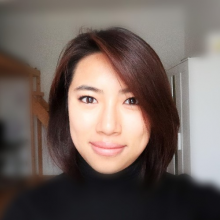
Lyra Hou
This interview is an excerpt of a longer conversation with alumni. At the time of the interview, Lyra worked as a Senior Associate of American Real Estate Partners. Prior, she worked as a Senior Financial Analyst at AvalonBay Communities.
Please share a little about your background and how you got to where you are.
I graduated in 2014 with a double major in Math and Economics. While in college, I knew I didn’t want to go the banking or finance route; I thought real-estate would be a good alternative while still having a strong emphasis on analytics. I first heard about AvalonBay through an Econ department lunch chat; they are a real-estate investment trust which specializes in multifamily rentals. After graduating, I started working for their financial planning and analysis (FP&A) department. I worked there for five years before moving to American Real Estate Partners, which specializes in commercial real estate.
Could you talk about what it was like for you working in real estate and some technical skills you needed?
My team at AvalonBay has a very collaborative and nurturing environment, which I did not quite expect from an industry like real estate. It also thinks very highly of Uva graduates. On the technical side, I never used Excel before arriving at the job. The FP&A department mostly recruits new graduates. They were looking for someone who was ready to learn, not necessarily someone who already knew Excel. The real estate industry is rather slow in adopting technology, so “hip” coding languages like Python aren’t really used that much; most work is still done in Excel. At American Real Estate Partners, it’s a bit more “sink or swim” than the hand-holding that my team at AvalonBay does, but this was expected because I came to them with some experience already.
What experiences did you have that you believe were helpful in finding your first
position?
Honestly, it’s less about the actual experience than your ability to talk about how it helped you develop; the ability to market yourself is just as important as any technical skills you’ve learned. If an opportunity seems interesting, just pursue it; don’t put too much attention on how applicable it is to a certain desired position. As long as you can tell a story, it’s valuable. How can you convey grit and curiosity through your resume/interview? Treat interviews more like a conversation and less like a Q&A session; it’s much more natural and much more enjoyable. People who are interviewing would naturally gravitate towards candidates they have an easy rapport with.
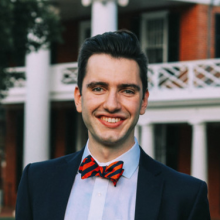
Alexander Gromadzki
At the time of this interview, Alexander worked as a Data Scientist at Guidehouse. Now, Alexander works as a Senior Data Scientist for the US Government Accountability Office.
This interview is an excerpt of a longer conversation with alumni, who work and study data science.
Please tell us a little about yourself.
I graduated with an economics degree in 2018, taking some computer science classes along the way as an undergrad, since I was interested in broadening my quantitative skills. After completing my undergraduate studies, I got my masters at the UVA Data Science Institute (DSI), which is now the School of Data Science. I currently work as a consultant for Guidehouse and am responsible for leading several data analytics projects for a public sector client. While at UVA, I was part of the Virginia Gentlemen and the Admissions Liaison for the DSI.
What technical skills did you develop, and what skills can students develop, to go into your field?
In my opinion, the most important skill in data science is the ability to code. I predominantly use Python in my day-to-day work. Any students looking to become data scientists should try to take classes that give them a chance to develop programming skills; otherwise, they ought to try to develop these skills on their own. If you are looking for self-paced learning, there are a number of online platforms that offer more structured coursework (e.g., Coursera), but you can supplement your learning with a combination of YouTube videos, data science blogs, etc. Try to find what works best for you. Even when looking for jobs that are less coding-intensive, understanding how to code something like a simple SQL query might give you an advantage in the job hunt. For students looking to hone their coding abilities, Kaggle competitions are another great way to challenge yourself and grow your data science skill set.
What do you enjoy about your work? What do you find challenging? What did you find surprising?
Guidehouse has given me many chances to grow, not just in a technical sense. Aside from my client work, I currently lead our AI and Automation Thought Leadership team, so I spend time learning and writing about state-of-the-art data science technologies and methodology. I did not expect to be in a leadership position in a decently sized consulting firm right after school, but since Guidehouse is still a newer company, I have been afforded many opportunities that I might not have had elsewhere to help the firm grow. On the challenging side, my client work often feels like a long game of telephone; I have to balance, keep track, and make sense of many stakeholders' interests, new information, and additional requirements, which frequently are indirectly relayed to me as I'm developing solutions. It always feels good though, to make those ends meet, and to help people realize business value through high-impact data products, based on information that they've always had, but never closely examined; I enjoy this aspect of my job the most.
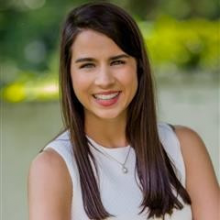
Kylie Chase
This interview is an excerpt of a longer conversation with Kylie. Kylie current works as Senior Business Development Manager, Global Health and Supply Chain at Chemonics International.
How did you know this was the field you wanted to be involved in, and has your job satisfied your career expectations so far?
I have always had a passion for international development and knew that was the sector I wanted to work in but I didn’t know what it actually meant in terms of job specifics. I applied to a variety of internships for my summer between 3rd and 4th year, and ended up working for a small USAID contractor, the Volunteers for Economic Growth Alliance (VEGA) on their business development team. When applying to jobs, I was able to speak most to my understanding of business development processes and show a year of experience working in that area of the larger business of global development. Chemonics has hiring in their new Global Supply Chain Division which was a great fit with my other major from UVa, Global Public Health.
I currently work for Chemonics, focusing on proposal development for contract opportunities with USAID and other donors. I’ve grown to love this job, especially the diversity of people and projects I work on.
How does an economics major help in your work?
Studying econ lets you take a “systems” approach to a problem. This has been applicable in the project management aspects of my job and comes in handy when trying to learn about specific topics because it gives me a framework and a baseline level of understanding from which I can work. Occasionally, topics learned in classes such as Econometrics and Economics of the Public Sector will arise, but it’s not super common.
Can you talk about some of the skills you have that could help students to be competitive for this type of work?
The vast majority of what I do on a day-to-day basis are things I’ve learned on the job. It is a lot of writing, research/analysis, budgeting and people management. Two elements I see as critical to success and that are low hanging fruit to boost the competitiveness of an applicant are writing (we ask most of our candidates to provide a writing sample) and basic excel skills (you can take online classes to learn!). General enthusiasm about what you’re doing also goes a long way; people-skills will feature heavily when you work with teams or participate in meetings.
What’s your workday like?
Every day looks different, which I love. Right now, I’m working on a long-term preparation or “capture effort,” for a large global health supply chain program USAID is designing which will support the availability of health products in developing countries. Right now, every morning, I attend a “capture” team meeting, where we review stuff from yesterday, talk about what is ahead for the day, and clarify our priorities. This sets the stage for the day which involves many meetings, brainstorming sessions and some independent research. I’m also involved in a lot of “partnering conversations” with representatives from companies who work with us.
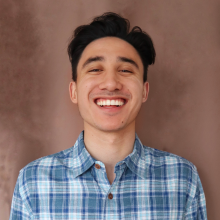
Troy Sweeney
At the time of this interview, Troy worked on IBM's Business Development Sales Rotation. Since, he worked as an Account and Partner Executive at IBM, as a Fellow at Vencapital, as a Scout and Writer at Storied, and as an Analyst at Flourish Ventures. Now, Troy works as an Associate at Netcapital.
This interview is an excerpt of a longer conversation with alumni, who work in business development.
Please tell us about your career path.
I graduated from UVA in 2018 with a degree in Economics. During my time as an undergrad, I had many conversations with superiors, friends, family, and alumni about what I wanted to do. I eventually spoke with an alum who piqued my interest in sales, given its work-life balance with flexible work hours and remote culture, since the priority is that you hit your numbers. After graduation, I wanted to build my skill set, so I chose to join the Summit sales rotation program for IBM, where I currently work. So far, it’s been satisfying all the expectations I had coming out of school.
What relevance does an Economics major hold in your profession?
Studying Econ for me was about developing my understanding of human behavior and what drives the actions of individuals and businesses. When an employer like IBM looks for people who can hold an intelligent conversation and ask good questions, an Economics major is definitely among the strongest there is in those aspects.
What’s your daily life like at work, and what have you learned to be good at your day-to-day duties?
Every day is different for me. Sales jobs will be pretty regimented at the beginning, though it might depend on your particular manager. You will be asked from time to time to join meetings in addition to the usual duties you have, and you have to prioritize what you say “yes” to and what you have to decline or put off for tomorrow. A big part of the job is learning to optimize your schedule, and each Monday, I will budget time in for my own activities throughout the week to make sure I can be as productive as possible prior to agreeing to help with other projects and tasks.
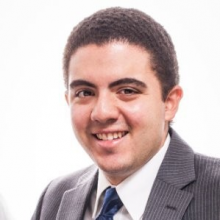
Kareem Hekal
At the time of this interview, Kareem worked as an Associate at Deutsche Bank. Since, he worked as a VP of Deutsche Bank and now is a VP at Societe Generale.
Kareem's Background:
Kareem majored in economics and foreign affairs at UVA. As a student, he worked at a golf club and found work opportunities by calling and emailing alumni whom he met at the club. Between his third and fourth years, he interned at the Royal Bank of Scotland (RBS), developing an interest in capital markets. After graduation, he worked at Mizuho for three years before contacting a recruiter at Deutsche Bank, where he is now an associate focusing on the aviation industry.
Questions:
Generally, what does someone working in capital markets do?
I actually work in a hybrid of capital markets and investment banking (refer to Jamie Schlim’s answer for details on investment banking); there are lots of individual teams that work on certain projects. In a nutshell, capital markets teams talk to investors and raise money for them. So for example, as someone working closely with the aviation industry, we structure aircraft leases such that the companies leasing can borrow money long-term against those leases.
How did your major(s) translate to your career?
One of the most important aspects of finance is the ability to understand concepts. Financial statements and models have numbers, but to understand them requires the ability to grasp their relationship to each other and non-numerical concepts. Obviously, a liberal arts education can do a good job with honing that, plus communication, which is also an important skill.
Can you share your insight on how to build skillsets outside of coursework?
Reading a lot of current affairs and financial news is a good thing to do. In every one of my workplaces, we’ve had MSNBC on in the background, and those panels are pretty helpful too if you’re into TV. Also, while reading or watching, write stuff down that you find interesting and think about them.
Which Excel formulas should you know off the top of your head for the job?
I use pivot tables and v-lookup a lot. SumIF is also common. In terms of more complex models, we have modeling teams and modeling templates to refer to; it’s very rare to have to build an Excel model from scratch in my job.
What advice for recruitment/virtual recruitment do you have?
It’s a good idea to put your hobbies and interests on your resume, even if they aren’t work or merit-related. In terms of interviewing advice, it’s difficult to get reads on people virtually; don’t get discouraged if the interviewer’s body language doesn’t come across as welcoming or impressed.
Favorite/least favorite thing about your job?
My favorite thing about this job is that everything can change in a day. The nature of deal-making requires you to be on your toes all the time, and I like that. My least favorite things are the egos I deal with; I talk to CEOs, managing directors, and partners at law firms - all of them want to get their word in when we meet and sometimes they bicker with each other.
If you had a change of heart while working, how difficult would it be to switch to a different area of finance?
I assume we’re talking about staying in the company. In that case, it’s pretty easy. A few people in our group came from sales and trading. Don’t try to switch within your first six months of the job; try to get used to your position first. But if you do decide you want to switch later, banks usually prefer that over letting you go.
What are interviews like?
Initial screening interviews are done over phone. The first round interviews are done with junior employees, and focus on behavioral stuff. Then you meet with more senior people, like managing directors; these interviews are more technical, and you may be asked about current happenings or concepts like EBITDA and factors that affect it.
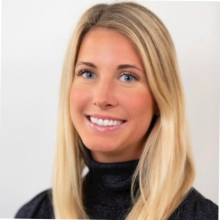
Jamie Schlim
At the time of this interview, Jamie worked as a Leveraged Finance Credit Research Analyst at Credit Suisse. Since, Jamie worked as a Syndicated Loan Sales Associate at Credit Suisse and now works as a Leveraged Finance Sales Associate at Jefferies.
Background:
Jamie became interested in sales and trading through some of the classes she took for her economics major at UVA. These classes included Theory of Financial Markets (ECON 4340) and Behavioral Finance (ECON 4370). She interned for Credit Suisse’s global credit products group after her third year. After graduation, she started working in credit research for CS, and now works in high-yield finance.
Questions:
Can you go over Sales/Trading and how it differs from investment banking?
“Sales and Trading is oriented towards the public, and it deals with the aftermath of companies raising equity and debt (which is what investment banking focuses on). We deal with the secondary market, which is where the debt and equities freely trade. We sell securities to buy-side investors. I’ll go over three types: traders, sales groups, and sector strategy. Traders take on the risk by actually buying and selling the securities; it is a very quantitative job, and traders usually specialize by sector, like energy or healthcare. The sales group works under the trader; sales tries to convince the buy-side that the securities we sell are worthwhile. I work in sector strategy; we do research to cover all of the bonds our traders trade. We also build models for every company whose bonds we trade. That way, we can help the traders and sales by giving them detailed data and news.”
How did your major translate to your career?
“There are lots of classes in the Econ department that help with understanding finance. Along with the two classes I mentioned in my background, Money and Banking (ECON 3030) and Corporate Finance (ECON 4350) helped me prepare really well for my internship. Sales and trading isn’t rocket science, so a basic econ major can help you understand the main drivers behind the securities market.”
What do you recommend doing, outside of classes, to prepare yourself for a sales/trading job?
“It’s very important to be knowledgeable about the world and current affairs; it will help you in interviews and on the job. Reading a lot is important; sooner you start, the better. I read The Morning Brew along with The Wall Street Journal. Also, it’s helpful to write down key information that’s updated everyday, like values of market indices; it will help you stay on top of stuff.”
What Excel formulas should you memorize?
“I actually didn’t have much of an Excel background while in college; I came into my job only knowing how to copy and paste. I generally pull information from Bloomberg’s terminals for more complicated financial models. V-lookup and SumIF are good simple statements to know; both of them help with sorting.”
What is your favorite/least favorite thing about your job?
“My favorite thing is the environment. It’s competitive, but there’s a teamwork feel. My coworkers have a lot of energy and are fun to be around. My least favorite thing was that at the beginning, it was daunting to arrive at work so early, since I’m not a morning person. But I got used to it, and I think most people can get used to it.”
If you changed your mind about your career, would it be easy to switch to a different area of finance from sales/trading?
“Sales and trading is a little difficult to transfer from. Nonetheless, a lot of skills are transferrable between capital markets, sales and trading, and investment banking. Research skills in particular are very versatile; if you know the fundamentals of credit analysis, it shows that you know how to value companies, and thus you can even move to the buy-side down the road.”
What are interviews for Sales and Trading like?
“At CS, they will personalize your interview to your resume. If you don’t list finance experience on your resume, they won’t ask you about it; if you do, they will. There are questions aimed at gauging work ethic and how you deal with pressure. Most technical questions are geared towards current happenings in the market; an example would be ‘what have you read about the Fed recently?’”
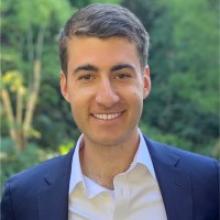
Andrew Dailey
At the time of the interviw, Andrew served as a director at FTI, specializing in forensic and litigation consulting for healthcare clients. Now, Andrew serves as Senior Manager, Business Innovation - Strategy & Consulting at Pfizer.
Questions:
Can you tell us about why you became interested in FTI, and why you stayed with them?
"I was interested in consulting bc it gave me the opportunity to work with a variety of projects at
the same time. The accounting internship was boring for me since the days were too similar.
Not only clients, but roles differ day from day in consulting, especially with FTI; for example, I
worked with pharmaceutical groups, insurance companies, hospitals, law firms in my first year,
and this diversity has continued."
What is econ/lit consulting?
"What I do can be used interchangeably with 'forensic litigation consulting.' Usually, a 3rd
party law firm who represents some sort of client who’s in a stressful situation will come to us,
and they want us to come in to do some damage analysis and data support to give them the
info to provide a favorable outcome for the client. Sometimes we work with just the legal team,
and sometimes we work with a combo of the legal team and the client. Additionally, we work
with valuation and private equity firms sometimes."
How do you think your education has helped you?
There are two main ways econ degree has helped. The first was developing my knowledge of
statistics, which is used a lot in my occupation. The second was giving me some basic
experience with coding, since many econ classes at UVA use stata.
What advice do you have for people trying to go into consulting?
Get some experience writing. Maybe take some English classes at UVA. The ability to
summarize info is very important; in typical consulting cases, you’ll have to contribute some
writing to a report to the third-party. Also, improve your oral communication skills; learn how to
do public speaking for example.
What did you start out doing at FTI? How do roles change as you move up?
I started in health solutions, and I’ve stayed in there since then. My responsibilities have
gradually shifted from being data analytics and writing-focused to a more client-facing role.
Over time, as you get more experience, you will have more contact with the managers, and
more will be expected from you. You will also take on administrative duties. You’re expected
to become more of a leader after a while.
What do you like most about your daily work?
We are a very collaborative group at FTI; the working environment is not cutthroat (most other
small economic firms will probably have a similar culture). Managers are always open to
answering questions and providing help. We also have daily discussions about our lives
outside of work! Everyone supports each other, and I love having hat sort of environment
around me day to day. I also like the variety of projects I work on, which I’ve touched on
before.
What do you find challenging?
Time management is a big issue. Nobody’s perfect at it at the beginning. You will learn when to talk and ask for help as you gain experience.
The deadlines in litigation consulting are usually a bit stricter than deadlines for regular management consulting, because of our legal- focused work.
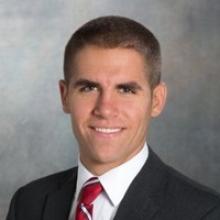
Michael Pugliese
Watch Michael’s interview with the ECO and the UVA Career Center as he discusses the role of economic research in banking and financial services.
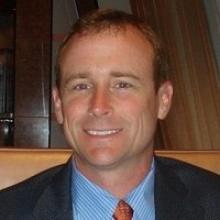
John Brandberg
At the time of this interview, John worked as a Finance Director at Family Care Operations.
John’s story:
At UVA, John majored in economics with a minor in environmental science, spending his summers between school years working as a door-to-door book seller. Unsure about what he wanted to do, he interviewed for a wide range of positions, including those in sales and finance. He started his corporate finance career at (P&G) in Cincinnati, working in “starting assignment” roles such as internal audit and forecasting analysis. During this time he worked on projects that would later become the Swiffer and Febreze brands. After 5 years, he switched his focus to operations and supply chain management, which he still works in. He also participates in On-Grounds recruiting on behalf of P&G.
Questions:
Can you speak to how majoring in the College of Arts and Sciences helped you?
“If you’re a student in the CLAS, your writing and communication skills will be at an advantage over students in more technical majors. Schools such as Engineering and Commerce tend to have a limit on what courses you can take, which narrows focus to the analytical side versus the more well-rounded approach an economics major will take you on.”
What do you love about your role?
“I like the purpose and values that P&G espouses, and I love working with my coworkers. It’s important when looking for a job that you find a company whose mission and people you like. My reason for gravitating to supply chain and operations is because it’s even more about the people that something like corporate strategy. For example, in operations, there’s over a thousand people that work together, which translates to lots of opportunities to be a leader, to communicate, and to improve performance among your peers.”
What skillsets outside of coursework would be relevant to corporate finance?
“You should be able to demonstrate some skill that lies outside the focus on your major. This skill can be on the softer side, like general knowledge of statistics, or on the harder side, such as fluency in data visualization tools like Power BI and Tableau. On the more basic end, knowing to check your emails and messages regularly is important, as is knowing how to communicate succinctly. In terms of on-grounds activities, try to show interest in business and finance by either joining some business-related club or taking a position like treasurer.”
Recruitment is a stressful time for students; do you have any strategies for virtual recruiting?
“Focus on online applications and assessments; assessments help filter out applicants who don’t pay attention to the process, so you should be careful when taking them if they’re part of an application. Having connections at a company is a good way to follow up on applications, and they can speed up the overall process since there’s so many applicants to get through.”
“As for interview strategies, make sure you have your best several stories lined up. Stories are very important during interviews because they can usually fit a wide range of questions. These stories are best spread between school experiences, work experiences, and extracurriculars. The first couple of minutes of an interview are also important, and you should build rapport and show that you’re comfortable in the environment.”
Many students did not have the opportunity to participate in internships this summer. What is your advice to those people?
“I never had an internship as an undergrad; they’re not necessary for a meaningful summer experience. Right now is a good time to pause and reassess what it is you want to do. Ideally, you should be able to demonstrate that you’re trying to improve yourself. Things like reading more, doing online coursework, teaching yourself something, are all good ways to show that. This is also a good time to network over the internet. Think about ways to give back to your community in a time like this; it’s a great demonstration and could be an opportunity for a great story!”
How would you define corporate finance, and why did you decide to do it?
“Working in corporate finance means you work for and represent the shareholder; your decisions will be focused on growing market value in balance with other concerns. An advantage to starting your career in corporate finance is that it tends to have more job openings than investment banking and financial services.”
“I like the analytical and strategic aspects of finance. I interviewed for corporate finance as well as sales positions; P&G happened to choose me for finance. It’s not as cutthroat as stereotypes suggest and after a while you will realize that it’s normal to learn on the job. Finance for large corporations is largely a collaborative environment.”
Anything else you’d like to share?
- “As you go through the process, comfort yourself; you go to a good school, you’re listening to (or reading) this, so you’re already on the right path.”
- “During the interview, make sure to interview the employer as well; ask them tough questions and make sure you really do want to work for the company.”
- “Emphasizing the employer over the field when looking can help you later down the path if you want to change positions, since a company you work well with will want to keep you and accommodate your change in interests.”
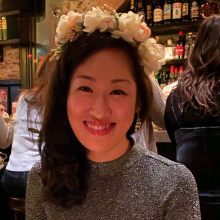
Mimi Wu
Since the time of the interview, Mimi has been involved as a board member for EcoPost Ltd, an advisor and consultant of GREENMANTRA Technologies, an advisor for Savia Ventures, and a mentor for Cycle Momentum.
My career path: After finishing undergrad, I furthered my education in the Batten School while working as a research assistant at USAID. Graduating from Batten, I took on a consulting position at World Bank. From there I held many consulting and management positions in various industries (public health, policy, microfinance, product, education, etc.), and eventually decided to start my own company: Myanmar Recycles.
Becoming the founder and CEO of a successful, impactful company: In 2017, I opened a plastic recycling factory in Myanmar - a country I had no prior connection with - and have been working to recycle plastic film with a focus on post-consumer plastic waste. In 2020, Myanmar Recycles was selected as one of eight global companies to pilot the world's first plastics credit scheme. This pilot program allows corporations reliant on plastic packaging to buy credits generated by plastic recycling and collection companies. Behind this are leading carbon offset standard Verra (formerly VCS); non-profit BVRio founded by Pedro Moura Costa, perhaps a familiar name from his development of the first carbon offset verification standard and his global leadership on GHG emissions reduction; notable corporate companies, such as Tetra Pak and Nestle; and advisors including Conservation International, South Pole, and McKinsey.org.
Tip for current students:
- Seek out varied work experiences at different organizations, both at home and abroad. The reality of working in an emerging country is that there will be many challenges you never anticipated, but living abroad will build and strengthen your resourcefulness and expand your understanding of humanity’s interconnectedness, challenges, and collective strength.
Infomation taken from Batten's Alum in Action interview with Mimi.

Shafat Khan
At the time of this interview, Shafat worked as Program Coordinator at Ashoka's Youth Ventures. Now, he is the Partnerships Manager at Ashoka.
Why Econ?
I actually did not graduate with a degree in Economics, I graduated with a major in South Asian Cultures and Languages, and a minor in Entrepreneurship. However, my UVA education is mostly shaped through the Economics courses that I have taken, which has in turn shaped how I think about the world. In particular, Professor Lee Coppock's Public Choice class was my favorite, because it gave me the know-how of applying Economic theories to other markets such as Politics, For-Profit, etc.
My career path:
My goal coming out of college was to be a changemaker and work on projects which enables positive change in the world. I have worked at various startups every single summer in between my college years, as well as worked on my own social enterprise for 2 years which ultimately gave me the experience I needed to perform at my current role at one of the top non-profit organizations in the world, Ashoka. I work on our Youth Venture team which is focused on building a movement to make sure that every child in the world has the same opportunities to succeed regardless of how, or where you were born.
A typical day in the life?
I currently live in Washington, DC and have absolutely loved my time here so far. I wake up to a cup of coffee everyday, and absorb the beginning of the day. I then take the metro to our office in Rosslyn, VA and listen to an NPR podcast called How I Built This which is about the stories of innovators and entrepreneurs. After work, I like to come home and start cooking, which is my time to destress from the long day. Usually I play soccer right after work as well, which is not only my favorite sport, but a great way to meet people in the city. Overall the main purpose of a typical day is to learn at least one more thing.
What I look for in coworkers and teammates:
Passion for their beliefs, Empathy and Self-awareness.
Advice for current students
Being from a country such as Bangladesh which is miles away, and more importantly, having to leave friends and family was one of the most difficult decisions I had to make. However, I found my own family in Charlottesville, and am proud to call it one of my homes. Be adventurous, and seek discomfort so that you can grow as a student, and as a person. Whoever said, college is going to be the best 4 years of your life, was lying. It definitely will be 4 of the most memorable years, but make sure that you're striving everyday to have better years tomorrow as well.
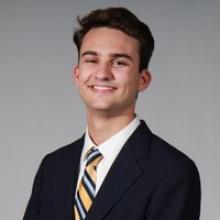
Alex Swope
At the time of of this interview, Alex worked as Senior Manager of Foundation Relations at American Enterprise Institute. Since, he worked as an Director of Corpate and Foundational Relations at American Enterprise Institute and now works as a Public Policy Manager at Amazon.
Why Econ?
I started out as a politics major, and that’s how I got my interest in economics, as the two are closely linked, especially in policy. While being asked questions like, “How do we know if this policy is right or good? How do we know we are doing the right thing?” I realized that I wanted to learn more about how to answer those questions. Ken Elzinga’s micro and antitrust classes were both amazing Econ courses, and I particularly remember Lee Coppock’s Public Choice class as the perfect mix of economics and politics. I think if I could go back in time, I would have taken an accounting class too.
My career path:
Before AEI, I did some campaign work for my local government and interned at a home-automation startup. During my fourth year, I worked at the Economics Career Office as the first-ever student staff member. I got my job offer from AEI in spring, and, yes, companies are still hiring in the spring and summer of your fourth year!
I started at AEI right after graduation in the summer of ’15 working on foundation relations. I really enjoy my work, which provides an opportunity to work directly with scholars and senior staff to plan and execute projects for the Institute.
Attributes I look for in coworkers and team members:
Good attitude, good at giving constructive feedback and even better at taking criticism. Hard workers who know how to get things done.
Advice for current students:
Don’t be afraid to look outside the box, AKA outside of the career paths that everyone else is doing. Particularly Econ students. As you apply, do your homework. People can tell when you’ve mass-applied. Be mindful about how you’re presenting yourself. You don’t fool people as well as you think!
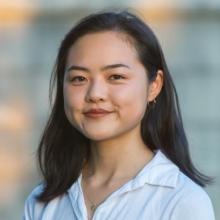
Sara Ho
At the time of this interview, Sara worked as a Research Assistant at Richmond Fed. Now, Sara works as a Team Lead Data Engineer at Rad AI.
Why Econ?
I didn’t know what I wanted to do at UVA, so I took all the Comm school pre-reqs, just in case. I ended up really enjoying the introductory Econ courses and I really liked solving micro problems in 3010, so at that point I decided to stick with economics.
My Career Path:
Between my third and fourth year, I interned at Merkle as a Paid Search Engine Marketing (SEM) analyst. That entailed pulling metrics for clients' ad campaigns and making weekly progress reports. I really enjoyed the analytical part - I learned a lot about SQL and Excel - I didn’t know at the time how valuable those skills would be. Overall, Merkle was a great company to work for. As interns, we received the same training as new-hires. After my internship, I was also able to continue part-time during my fourth year; my co-workers and managers were very supportive.
I took an economic history seminar with Professor Mark Thomas during my fourth year. That class exposed me to reading papers and applying analysis, so I started to consider research-related positions. I met an influential alum at an ECO event (you should attend those!), who suggested I apply to the Richmond Fed.
Being a Research Associate for economists provides a really great launching pad into graduate school. I’m currently applying to grad schools in data science. My co-workers have gone on to grad programs in economics, statistics, law school, etc. What I did not fully appreciate as an undergrad is that all quantitative grad programs require a strong math background. If you’re interested in a grad degree, I recommend trying a calc III or linear algebra class.
What a typical day like for a Research Associate at the Federal Reserve Bank of Richmond:
I serve three projects right now and split my time between them. One of the projects I’m working on is a paper I am co-authoring which includes a lot of reading, writing and editing. Another project I’m working on is quantifying the differences of occupations, which is rather coding heavy (Stata and Matlab). Finally, I am working on an independent project with another RA; we are analyzing workforce transition rates for women (lots of coding and plotting in R). In addition to project work, we attend seminars from visiting economists and sometimes we give presentations as well. It is intimidating, but very rewarding to receive critiques from economists during presentations.
Tips for Current Students:
Get professors to know you and attend office hours with thoughtful questions. If you are interested in a Research Associate job, ask your professors about it (there is a good chance they were an RA at some point in their careers).
I received a lot of rejections to jobs that I applied to during my fourth year; I did not receive my job offer from the Richmond Fed until after graduation. Ultimately, I am kind of glad I was rejected so many times because I definitely would have taken the first job that was offered. In the end, being an RA at the Richmond Fed was a really great fit for me. My advice is: don't take rejections too harshly, and use them as learning experiences.
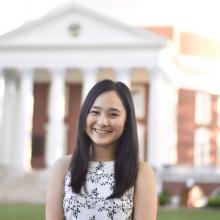
Sano Nagai
At the time of this interview, Sano worked as an Associate Technical Project Manager at Yext. Now, Sano works as a Senior Solutions Consultant at Smartsheet.
Why did you major in econ? / Has it served you well?
I majored in econ because of a great experience I had in my junior year of high school. My school offered AP Micro/Macro, and the teacher was incredibly enthusiastic, understanding, and knowledgeable. Aside from the teacher, I enjoyed learning how data points and logic are able to explain what may seem mundane and "normal" in everyday life. Knowing that numbers are able to tell stories was what drew me to the subject. At UVA, I dove right into the major and enjoyed the diverse courses offered - from development to international finance to auction theory! I believe the logical thinking and information synthesizing skills have served me well outside of academics.
Favorite econ courses/professors?
My favorite econ course is ECON 422 (International Finance) with Eric Van Wincoop. The professor is extremely knowledgeable and also helpful during office hours! The subject matter is incredibly interesting to me, as I had a concentration in International Economics - it was my first finance class, but it didn't feel boring at all. In fact, learning about the economics of relevant events like the shock of 2008 was eye-opening for me as a first year.
Some tips from your experience with the application –> job process?
My best advice is to leverage the amazing Career Center that UVA has. The huge career fairs as well as one-on-one counseling on career path/resume building/networking has helped me tremendously. In addition, for economics majors specifically, we have an amazing network of alumni as well as a dedicated Career Counselor, Jen Jones, with the ECO. From specific events catered towards econ majors to job/industry specific interview practice, Jen and the ECO have been an amazing resource for me (even past graduation)!
Something you want to tell current students?
I would tell students to enjoy their UVA days as a student, and not focus so much on the pressure of "getting a good internship/job." With a UVA education and the resources available, you are much more capable and employable than you may believe! Don't doubt your abilities, and don't let that thought hinder your performance in academics or ability to enjoy your college days.
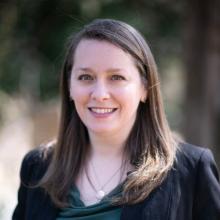
Kristina Koutrakos
Why Econ?
Because I didn’t know what the stock market was and wanted to challenge myself to learn. I took Prof. Elzinga's 2010 Micro class and loved the material. I then took Prof. Burton’s class, Introduction to Financial Markets, and I was totally hooked. Ed’s a storyteller and his stories about his career path helped me figure out my own.
My career path:
I accepted a job offer from my internship between 3rd and 4th year at Western Asset Management. I loved my team, I am still in contact with them today! My first job was as a risk analyst, and I enjoyed every minute of it. After 5 years I decided to take a position in NYC at Blackrock. Fast-forward to working as the management director and investment strategist for a multi-family office which managed assets for large families. I have always been passionate about supporting women in finance and finding avenues for women in the industry to become more successful. There was a great deal of appetite for women-run firms, but not enough research done on those firms, so I decided to conduct it myself. Female-run asset management firms have a much more difficult time getting hired compared to an equally capable male-run asset management firm.
What I look for as the director of an investment firm:
Diverse perspectives. I find that diverse teams with diverse perspectives are the most powerful assets a company holds. I look for confidence as well. Not confident? Why not? Understand that the hiring process takes a lot of time on the applicant’s end. Don’t take things so personally. Understand that you are UVA students and incredibly talented, skilled, and motivated. Big interview tip: Take 2 minutes before an interview to think about yourself from the perspective of the person who loves you most.
Advice for current students:
Work hard and follow your passion. Don’t follow the money, follow the passion. I’ve seen so many people make life-altering decisions for money. They traded meaning for wealth. The people I know who have been challenged and decided to follow their passions, those people somehow always end up being the most successful.
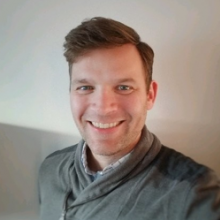
Scott Allen
At the time of this interview, Scott worked as Data Science Director at Electronic Arts Inc. After this, he served as Senior Director, Head of Mobile and Asia Analytics at Electronic Arts (EA). Since the interview, he has worked at NCSOFT as a VP of Data and Analytics.
Why I chose to enroll in Economics:
I have always been a problem-solver and went into college trying to figure out what areas of focus would give me the greatest tools to amplify that aspect of myself, of which I believed Economics (and Mathematics) would aid me the most. Economics provides a purview into the world and how people make decisions that's fairly unique, using quantitative methods to measure the qualitative impact of decisions.
What do you do for work now?
I now work as a data science director at Electronic Arts, Inc. (EA). I lead EA’s Data Science team in the global analytics organization; our mission is to ensure that EA is leveraging data to best empower ourselves to fully understand each player within our ecosystem. The work we do ranges from player-facing data products, such as in-game recommendation engines and multiplayer matchmaking, to indirect support by developing tools and systems that expand the capabilities of other teams within the company.
We strive to promote a data-centric culture within EA as a whole, pushing marketing groups and game teams alike to think of how to use data to make better decisions.
Favorite course:
I loved Economics of Japan because it highlighted two things: First how different the cultures of our world can be, and secondly and perhaps most importantly, how similar the underlying mechanics and motivations of our actions really are.
Advice:
- Take risks and don't be afraid to try a lot of different things; learning how to fail fast is one of the best techniques I've ever learned.
- Try different jobs and branch out from your hobbies; you'd be surprised what comes in handy and how things you learn in two totally unrelated fields marry together well.
- When you make a decision, commit to it; nothing kills motivation and positive inertia like second-guessing yourself.
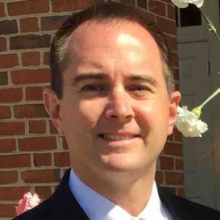
Matt Newsom
At the time of this interview, Matt was Senior Director at Smithfield Foods.
Why did you major in Economics?
I didn’t want to go to law school and I was good at math. I hadn’t been exposed to econ much before UVA.
What were some courses that you enjoyed at UVA?
Theory of Financial Markets with Ed Burton; History of the South with Ed Ayers, who went on to become the President of University of Richmond. I took that class as a Pass/Fail not knowing what to expect. It was very engaging and then I wished I had not taken it as Pass/Fail.
What activities were you involved with at UVA?
UVA’s club water polo team.
I’m in a new role as the Senior Director at Smithfield. In this role, I protect the interests of Smithfield and its employees. I work to find ways to do business better. I’m responsible for strategy, finance, and leadership. I learned about my first job at a poker game with some guys who worked for Smithfield. I started out as an analyst and I’ve been with the firm for 15 years.
What else keeps you busy?
I have 7-year-old twins.
What do you read or listen to so that you stay informed about your field?
Every morning, I listen to Squawk Box on CNBC and Mornings with Maria on Fox Business. I’d like to read more than I do.
Advice for students?
Be open to opportunities and things you’re not comfortable with. Working with a big company has big advantages, like moving into new departments if you’d like a change. Embrace a little change.
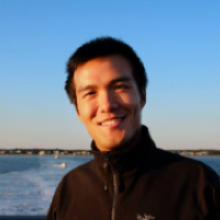
Paul Chen
Why did you major in econ?
Ken Elzinga. Through my economics major, I gained a teacher and friend in Ken. Ken also officiated my wedding at St. Paul’s on the corner. My true intellectual love is math, which I also majored in.
In my current position as senior investment manager at Alibaba,
I frequently travel between China, Europe, and North America. My investment specialties include artificial intelligence, Big Data, personalized medicine, computer vision, autonomous driving, and other emerging technologies.
Having transitioned into new places many times, I have gradually realized my calling to build bridges across cultures. This is why I am excited to get up every morning to join others who recognize our common humanity to make the world a better place.
How did you find your way to your current position now?
I was born in Chengdu, China (home of pandas and spicy Sichuan food). I lived through the 1990s and early 2000s in China as a teenager where I witnessed how cultural waves of liberalism and liberty first re-entered China. At almost 16, our family immigrated to the U.S. (in Norfolk, VA). Since then, I studied / worked in Silicon Valley, New York, Boston and Virginia. I became in love with investing at UVA. But banking took me through a long detour away from investing. Two years ago, a recruiter reached out to me about the tech investing opportunity at Alibaba, I grabbed it.
Some advice for current students seeking internships and jobs?
Depending on your risk preference and economic situation:
|
|
Risk Seeking |
Risk Averse |
|
“I need to put food on the table” |
Work at a fast-growing organization |
Interview for banking and consulting |
|
“I want to chase my dream” |
Chase your dream |
Work at Goldman. Save $1mm, and then chase your dream |
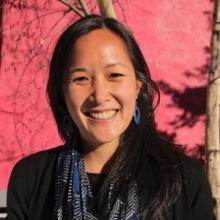
Katrina Ngo
At the time of this interview, Katrina was Senior Manager at the Global Impact Investing Network. Since, Katrina worked as an Impact Investor Relations Director at Kiva Capital Management and now works as an Advisory Group Member at Colorful Capital.
Why econ? It is a truly versatile major that touches many aspects of life. I was thinking about keeping future career options open and added Economics as my second major while keeping Biology (and abandoning pre-med) for my personal interests.
What is impact investing? What do you do as senior manager at the Global Impact Investing Network (GIIN)?
Impact investing is a relatively new field, although global interest is growing. The GIIN is a global champion for growing the scale and effectiveness of impact investments, which are investments that are made with the intention to generate positive, measurable social and environmental impact alongside financial return. Examples of impact investing occur in affordable housing, microfinance, and renewable energy. I travel overseas (to place such as Mumbai, Singapore, Copenhagen, and Nairobi) often for my work, attending external meetings and conferences related to impact investing. I’ll either present at conferences or host GIIN conventions with key stakeholders in the financial industry, talking about the GIIN’s research or impact measurement and management resources. Impact investors span across public, private, and not-for-profit sectors and include banks, pension funds, governmental agencies, and nonprofits. When I’m not travelling, I live in NYC, mainly engaging GIIN stakeholders virtually.
How did you find your way to impact investing?
After graduation, I volunteered with the Peace Corps in Central Asia. I worked on sustainable economic and organizational development. In this area, I helped to identify areas of need with the community, and pursued grants to support some of those projects, including funding a new health center. Afterwards, I pursued my international affairs degree from Columbia University’s School of International and Public Affairs.
As an employer, what do you like to see in applicants?
- Strong project management skills
- Professionalism in managing important internal and external stakeholder relationships
- Knowledge of impact investing, sustainable finance, or ESG
- Personable, engaging presence, with diplomacy, tact and good humor
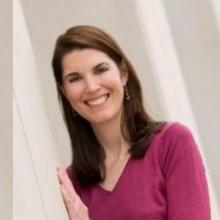
Diane Cherry
At the time of the production of this profile, Diane worked as the Environments Policy Manager at the Institute of Emerging Issues.
Why study economics?
Economics is one of the most important topics that explain everyday life. It tells us why consumers and firms behave the way they do and how they relate to each other and to institutions such as the government. As two examples -- economics explains how firms react to different types of regulation and how the Federal Reserve’s monetary policies impact the interest rates consumers face when they go to finance the purchase of their house. Economics can be applied to all kinds of sectors such as healthcare, the environment and education. In nearly every issue or discussion people want to know who is impacted and how much something costs. All of that requires an understanding of economics. More broadly, economics teaches analytical and problem solving skills that employers continually search for in their employees.
2. What course/professor was influential and why?
Dr. Ed Olsen was the most influential professor I had when I was at UVA. I was part of the economics distinguished majors program and spent my fourth year doing a research paper on how announcements of money supply affect interest rates and exchange rates. I really enjoyed the research aspect of the work and wanted to continue as a research assistant in some capacity after I graduated. Dr. Olsen provided me the names and contacts of several organizations in Washington, D.C. that hire research assistants out of college and I was fortunate enough to work for one organization for two and a half years before I went to graduate school.
3. What made the economics department attractive to you/what made it special?
The economics department was special for a number of reasons. First, I really enjoyed the distinguished majors program and the small number of students that were part of that group. We socialized together and studied together and many of us had similar career interests. Second, I really had a chance to get to know my professors – Dr. Charlie Holt and Dr. Ed Olsen were two of them-- and I have even stayed in touch with them fifteen years later. Third, the department offered a variety of classes in everything from labor economics to public finance and all of these topics explored economics in a different way. There really was something available for anyone and now the department offers even more classes than when I attended UVA.
4. Your job title is Environments Policy Manager. In your own words, what is it that you do and how is your job related to your major?
I am the Environments Policy Manager at the Institute for Emerging Issues, a public policy organization housed at NC State University and founded by former Governor Jim Hunt. In my job, I work collaboratively with individuals from all sectors and areas of North Carolina to build collective action in energy, infrastructure, transportation and the natural environment. I also teach U.S. Environmental Policy, Written Communication for Public Policy and other courses in the MPA program at NC State University. Previously, I worked as a senior policy advisor for North Carolina’s environmental director and as a Presidential Management Fellow for the EPA.
The environmental and energy field is very divisive. Economics plays an important part of the discussion of what the state of North Carolina should do to encourage everything from the development of renewable energy to the deployment of broadband in rural areas of the state. The other factor that permeates most of the discussions I am part of is the role of the private and the public sector in solving energy and environmental issues. Depending on one’s viewpoint, there should either be a strong role for the government or the outcome should be left to market. The conversations are interesting and economics inevitably has a big piece of the discussion.
5. What is an interesting project you’ve worked on?
One of the most interesting projects I worked on recently was developing a workshop for about one hundred stakeholders across North Carolina on the implications of the EPA’s Clean Power Plan (CPP) on North Carolina’s future energy footprint. The CPP’s carbon dioxide standards reflect “the best system of emission reductions” and each state is obliged to develop an individual program for compliance. This set of regulations serves as a national signal for the end of coal as the backbone of our nation’s energy needs. Meanwhile, the Plan also opens up enormous market opportunities for manufacturers of energy-efficient products and components of renewable energy systems. North Carolina’s manufacturers excel in both of these product sectors.
6. What advice do you have for students about their time in the department in relation to preparing for next steps?
When I was in my third and fourth year I knew I wanted to work for a while before going to graduate school but I didn’t know where or in what field. I found the professors an amazing resource to talk with about the opportunities available to economics majors. Dr. Olsen in particular was really helpful and provided me the names of over a dozen organizations that hired research assistants for two or three years. I interviewed with several before deciding upon Resources for the Future and that job has influenced my entire career trajectory.
7. What do you know now you wish you had known while you were majoring in economics at U.Va.?
I wished I had talked with more students who took different career paths following graduation. Economics is a major that leads to a number of careers. I never really considered consulting or law school but that was in part because I never had exposure to students who worked in those fields. I believe that the best way to find your path going forward is to get exposure to as many people who have different careers. Each time you learn something you don’t want to do it is a clearer path to finding what you do want to do.
8. Who (or what) has been influential in your career and why?
My graduate degree in public policy from the Kennedy School of Government at Harvard University was very instrumental toward my career path. I had an interest in policy issues back in the early 1990s when I left UVA and worked in Washington, D.C. but graduate programs in public policy then were not nearly as prevalent as they are now. I kind of backed into a public policy career after eliminating a Ph.D. in economics as one of my career options. My boss at Resources for the Future where I worked as a research assistant had contacts at the Kennedy School of Government and suggested that I apply there for graduate school.
9. What is on the horizon for you/other career goals you have in mind?
I have really enjoyed teaching public policy courses at NC State University and hope to continue teaching in the indefinite future. Since I’ve been working about twenty years in public policy it is fun to teach public policy tools to the next generation of professionals.
10. Tell us a fun fact about you.
I really enjoy running and have already completed five half marathons throughout North Carolina. I don’t think I’ll ever train for a full marathon but running is a great way to relieve stress and ruminate about things that require a lot of thinking.
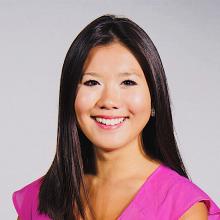
Joy Fan
At the time of this interview, Joy worked as a Media Relations & Marketing Associate at the American Enterprise Institute. Then, Joy served as an Account Supervisor at Ketchum before entering her current position as Account Supervisor for JPA Health.
Alumni Spotlight: JOY FAN, Media Relations & Marketing Associate at the American Enterprise Institute
Life at UVA and since graduating:
Joy graduated from the University of Virginia in 2017 with degrees in Economics and Art History. While at UVA, Joy was the president of the Rhapsody Ballet Ensemble while she pursued her personal interests in business and art. Some of her favorite economics courses were Money and Banking and Environmental Economics, although she enjoyed several public policy-focused economics courses.
She currently works at the American Enterprise Institute. She serves as the liaison between the press and over 30 AEI scholars in economic, financial services, tech, and healthcare policy.
What are your job’s responsibilities?
- 35% is pitching to reporters–sending research to print and broadcast reporters
- 35% fielding media requests (connecting scholars to media)
- 30% staffing media crews and events, updating media contact database, tracking press interactions for analysis later
Joy’s tips for students:
- Reach out to alumni–they always have good insights to share if not more help
- Don’t forget your resume and cover letter serve as writing samples
- Get as much writing experience as possible. Almost every job requires good writing skills, whether it be in the form of a report or memo, or even just as communication between colleagues
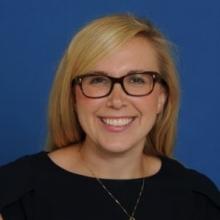
Emily Steinhilber
At the time of this interview, Emily worked as a Research Associate Professor at Old Dominion University. Now, Emily works as the Director of Climate Resilient Coasts and Watersheds for the Virginia Environmental Defense Fund.
Life at UVA and since graduating:
Emily graduated from the University of Virginia in 2007 with degrees in Economics and History. After UVA, Emily received her doctorate in Law and Masters in Environmental Law and Policy at the Vermont Law School, where she graduated magna cum laude. She has worked in legal clinics and in environmental policy for over a decade.
She now works at Old Dominion University as a Research Assistant Professor. She coordinates the Commonwealth Center for Recurrent Flooding Resilience and works with faculty members to ensure their work is useful for policy makers and the public. She works with entrepreneurs and innovators to support new ideas for adapting to flooding.
In your own words, what is sustainability?
Effectively using resources to ensure a better result.
Emily’s advice for students:
- Read up on as much literature as you can on the topics that interest you professionally and personally
- Don’t write anything important on your phone–take pride in your written work
- Do your research effectively and thoroughly–click on references in papers
- Ask people to have coffee!
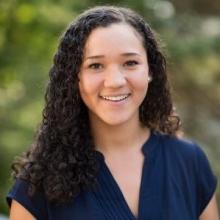
Eden Green
At the time of the writing of this entry, Eden worked with Allison Partners. Since, she has worked for Yext and now serves as the Manager of Partner Operations.
Life before UVA:
Eden is from a military family. She is one of severn children and grew up primarily in Northern Virginia. She was homeschooled until high school.
Life at UVA and since graduating:
Eden graduated from the University of Virginia in 2016 with a degree in Economics and Psychology. As an undergraduate, she served as a research assistant for the Olsson Center for Applied Ethics at the Darden School of Business, where she studied corporate social responsibility, and with UVA’s Department of Psychology, where she examined the relationships between happiness, social interaction, and technology.
She now works as an organizational development consultant at Allison Partners and spends her days exploring what makes people and organizations work effectively. She incorporates her interests in curriculum development, academic research, and behavioral economics into her work supporting client projects, creating training materials, conducting analysis, and managing proposals.
In your own words, what is Organizational Development Consulting?
We help with the messy, wonderful, complicated people stuff that happens when more than one person is in a room.
Advice to job seekers from Eden:
- Build relationships with faculty by getting involved in undergraduate research
- Always follow up on contacts that faculty / other supervisors may give to you
- Conduct informational interviews with people who work in fields that interest you and fields that don’t
- Learn to talk about yourself and your interests; know your story
- Read! Lean about and be able to discuss current research in your fields of interest
- Do more than match your interests with jobs—think about the kind of daily routine you really want
Eden’s Recommended Reading for Interviews
- Tell Me About Yourself: Storytelling to Get Jobs and Propel Your Career by Katherine Hansen
Eden’s Recommended Reading for Organizational Development Consulting
- The Art of Gathering: How We Meet and Why It Matters by Priya Parker
- Crucial Conversations: Tools for Talking When the Stakes Are High by Kerry Patterson, Joseph Grenny, Ron McMillan, and Al Switzler
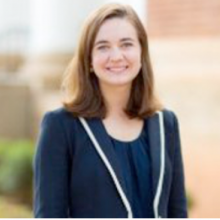
Emily (Snow) Miller
At the time of the interviw, Emily worked as a Consultant for BCG. Now, Emily works as a Project Leader for BCG.
1. Why did you choose to study economics?
A month into my first semester, Professor Elzinga gave a lecture in ECON 201 that changed the course of my college trajectory. The topic—rational consumer behavior—was neither inspiring nor profound, but the lesson stuck. I found myself measuring the costs of a good in terms of its next best alternative, ignoring sunk costs when I made a decision, and seeing applications of economics everywhere. Drawn to this “economic way of thinking” during my first months of school, I attended my professors’ office hours, participated in behavioral experiments in the VEcon Lab, and even went water-skiing with Professor Elzinga. As I pursued economics further in subsequent semesters, I was struck by its systematic explanations for the world around me—everything from business strategies to Congressional voting procedures to income inequality. I was fascinated by these questions and the way that economics answered them, and there was no turning back!
2. What courses/ professors have been particularly influential and why?
This question is a tough one, because there have been so many! I'm grateful to Mr. Elzinga for his wise counsel, steadfast mentorship, and the way that he constantly challenges me. His ECON 201 class first drew me to the subject, and since then I've had the pleasure of learning from him in his Antitrust seminar and through an independent study on the intersection of economic thought and Christian theology. I'm grateful to Mr. Coppock for his encouragement and natural gift for relating to students. His Public Choice seminar was incredibly interesting and stimulating, and it remains by favorite class to date. I'm grateful to Mr. Holt for his patience, kindness, and willingness to invest in my academic potential. Learning from his expertise in experimental economics has been a true privilege. And the list goes on! I'm grateful to Mr. Olsen for guiding me through my first research project, to Mr. Burton for connecting me wonderful people and opportunities in the Department, to Ms. Turner for her amazing dedication to her students' flourishing, and to many others who have invested in me.
3. What makes the economics department special?
As my previous answer demonstrates, the faculty in the economics department have made all the difference to me. They create an atmosphere in which freedom of inquiry flourishes and opportunities abound. During my time in the department, I've particularly enjoyed the opportunity to conduct research. Last year, I completed an independent study in which I used Stata to estimate the efficiency gains of housing vouchers as opposed to public housing. Additionally, I work as a Research Assistant in the VEcon Lab, exploring ways that human behavior either aligns with or deviates from economic theory. In addition to these pursuits, I've also gained immense value from the opportunity to serve as a Teaching Assistant in introductory economics courses. Teaching is a great responsibility and privilege, and helping my students grasp the discipline’s most fundamental principles reminds me of why I fell in love with economics in the first place.
4. How did you spend your summer between third and fourth year? (This language has been changed. Former question asked “How did you spend last summer?” Or, we may mention in the heading that these responses were collected while you were a student and now you are an Associate with BCG.)
I had a fantastic summer interning for BCG in their DC office. My role as a Summer Associate involved collaborating with my case team to strategically simplify the organizational structure of a large tech firm. Day to day, I spent good deal of my time building models on Excel, creating Powerpoint decks for client presentations, and performing data analysis with my team. At the most basic level, my task was to solve problems, and both the content of the work and the atmosphere of the office made my job both stimulating and sustainable. I have no doubt that the experiences the Economics Department has provided me differentiated me as a job candidate, and Jen Jones and the ECO office were enormously valuable to me as I navigated the job recruitment process. Furthermore, once I began my internship, it became abundantly clear that the critical thinking that I learn through my economics coursework would help me succeed in the Associate role. I am looking forward to returning to BCG as a full-time Associate next year.
5. What is the most interesting thing you've done in the Department?
Serving as one of the first undergraduate Teaching Assistant for introductory economics courses has been and continues to be an incredible privilege and learning opportunity. Standing in front of a classroom twice each week, I’ve learned to present economics concepts in creative ways. I’ve learned to establish credibility by coming prepared for class and by speaking with confidence. I’ve learned to establish approachability by adding lighthearted elements to my lessons and being transparent about any mistakes I make. Working one-on-one with my students, I’ve learned the joys of helping others succeed. I’ve learned to help my students work out practice problems themselves, rather than just listen to me explain them. I’ve learned to exhibit patience and encouragement in the face of my students’ frustration and disappointment, particularly after midterms.
As a returning TA this year, my goal is been to use these lessons to both improve upon my teaching and to be a leader among new undergraduate TAs. I seek to be a role model by putting my students’ needs above my own. Whether it means putting extra effort into planning interactive lessons, sacrificing time to meet outside of my office hours, or simply demonstrating to my students how much I care about their success, my role as a Teaching Assistant continues to be my most meaningful University involvement.
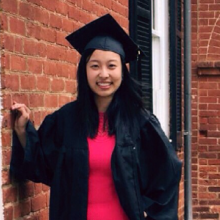
Ying Liu
At the time of this interview, Ying worked as a Senior Analyst at Cornerstone Research. Since, she recieved her MBA at the University of Chicago's Booth School of Business. She now works as Chief of Staff to CTO at EliseAI.
1. Why did you choose to study economics?
Coming into UVa, I knew that I wanted to major in something that is theory-based and can give me solid quantitative trainings. Economics major offers me these, and I can also apply theories that I have learned in class to explain phenomenon in my daily life.
2. What courses/professors have been the most influential and why?
I enjoyed taking many classes, including Industrial Organization with Professor Mills and Econometrics with Professor Michener. If I had to pick, perhaps Antitrust Policy with Professor Elzinga would be one of the most influential courses. In class, we examined the progression of court rulings of interesting antitrust issues over time, some of which took place during the timeframe of the class. I got a much better understanding of economic consulting, and applied for my current job.
3. Over the summer you worked as an intern. In your own words, what did you do in this role? How was it related to your major/how did you use what you've learned in the department to secure this role and on the job?
I interned at a wealth management firm over the summer. It was mainly a client-facing role with access to the most up-to-date market research data. I got to work with a wonderful team and learned more about the financial industry. The analytical training in the Econ Department prepared me well for this role.
4. What career goals do you have for your future? (immediate/long-term)
I will work for Cornerstone Research after graduation. After a few years, I plan to attend graduate school (MBA or JD).
5. If the ECO has helped in your experience at U.Va., kindly share how/why.
The ECO has been an extremely valuable resource in every stage of my career exploration. By attending numerous career panels, I got to see a wide variety of industries and met many distinguished Econ alumni. I also enjoyed speaking with Jen, who always provided me with constructive feedback and steered me toward the right direction.
6. What is a fun fact about you?
I graduated from a high school in Green Bay, Wisconsin. I did go to Packers games and I do own a Packers jersey, but I have never worn a cheese hat.
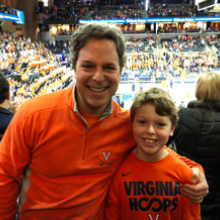
David Neuman
At the time of this interview, David was Principal at Trammel Crow Company. Now, David works as the President of European Operations at Trammell.
Alumni Spotlight: DAVID NEUMAN, Principal at Trammel Crow Company
Why econ? Economics is a great way to learn the driving forces behind business and the economy. It teaches you the fundamental building blocks for markets and the financial system and a logical way to analyze problems and situations. I graduated from UVA with my economics degree in 1999.
I now work as the Principal at the Trammell Crow Company. My job is to create value developing commercial real estate projects in the MidAtlantic region for my company’s stakeholders- those are the employees, tenants, residents, municipalities and communities in which we develop projects. I spend much of my time analyzing the relationship of risk and reward for specific development projects and, therefore, spend significant time quantifying and qualifying inherent risks of a project.
Which economics course was influential and why?
They were all influential! Perhaps the most interesting and memorable, which may be surprising to some, was American Economic History because it gave real examples of the causes of economics forces at motion and what happened in America when those forces dominated the economy (e.g., the Depression, inflation). Economic cycles are inevitable and learning from the past is the best way to prepare for future cycles.
Some advice for current students?
- Don’t stress about formulas, small facts or trying to memorize things- focus on understanding the concepts. If you focus on the concepts and remember those concepts, that is how you change your way of thinking and become a smarter person.
- When nearing graduation, it’s easy for students to fall into a trap of what they feel they “should do”, such as traditional fields like consulting or banking, however, if that student doesn’t enjoy that field, then how can one have a long, fruitful career doing it? Further, perhaps a student’s core strengths don’t favor that field. Therefore, finding a career path that’s enjoyable and values that student’s strengths is essential.
- I got C’s in both ECON 201 & 202! So, keep at it and keep positive!
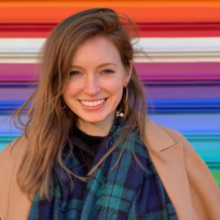
Rachel MacKay
At the time of this interview, Rachel worked as a Director of People Operations at Commonwealth Joe Coffee Roasters. She is currently getting her MBA at Northwester University's Kellog School of Management and just completed an MBA Private Equity Internship at Growth Catalyst Partners.
Why did you major in econ?
I chose economics because I loved the creative and analytical thinking required for every class. I could take economics classes on a broad range of subjects too (e.g., education, advertising, finance). Also, I didn’t (and still don’t) know what I wanted to do when I grew up; however, I knew an economics major was a solid foundation to build upon.
I now work as the Director of People Operations at the Commonwealth Joe Coffee Roasters. Commonwealth Joe is a start-up coffee producer and distributor based in Arlington, VA that was founded by several UVA graduates. My job is to build out our People Operations department from the ground up, to include establishing how our company does talent planning, recruiting, onboarding, performance, training & development, and succession planning. Since this company is a start-up, everyone is a jack-of-all trades. I’m also currently running with several operations initiatives including a new market expansion effort and a fundraising effort.
Which economics course was your favorite and why?
I really enjoyed Behavioral Finance. It’s at the intersection of psychology, economics, and finance, and I thought it was particularly applicable to how I would relate to money after I graduated.
How did you find your way to your current position now?
I worked at a large consulting firm for about 6 years post-graduation and I found the Commonwealth Joe opportunity through my network. I decided to make the jump to the start-up world because I saw I had the opportunity for a steep learning curve here. I had been doing strategic consulting within an HR department at my previous company and knew what an HR department should look like. I knew I’d immediately deliver value at Commonwealth Joe while learning the ins and outs of a fast-growing beverage company.
Some advice for current students?
Follow your passion and invest in your network. You can use the skills that you’ve learned in school in a variety of capacities. If you are unsure of what your passion is, then chase the biggest learning opportunities. You’ll learn your strengths and what you enjoy pretty quickly, and you can pivot from there. Your background doesn’t matter; the authentic relationships that you build along the way will help you get you where you want to go.
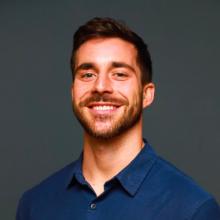
Mike Shebat
At the time of this interview, Mike worked as Senior Global Manager, Rewards Product at Uber. Now, Mike is the CEO and Co-Founder of Traba.
Why econ? I chose econ because I was fascinated by books written by Malcolm Gladwell. At the time, I was just starting to pay attention to the stock market and wanted to better understand how global events influenced the markets.
What were your favorite econ courses at UVA?
Ed Burton’s Theory of Financial Markets. As an economics student, Ed Burton’s class gave me the financial skills and context needed to prepare for my time working in investment banking at Goldman Sachs, asset management at Blackstone, and research at the US Treasury Department. Although not an economics course, Strategies of Entrepreneurship–taught in the Engineering school–was another great course. This class involved developing an MVP of product and presenting our work to a panel of VC’s, which was awesome!
How did you find your way to Uber? What do you do as an Innovation Manager?
As a fresh college graduate, I made the unorthodox decision to abandon my trajectory in finance and do something about as different from banking as you can get: I went to the West Coast to supervise 36 people on an industrial supply factory floor for McMaster-Carr. I wanted to learn how to inspire and lead a top-performing team from different backgrounds and develop a business strategy. After a couple years in the role, I then applied for the job at Uber and have been with Uber for 3 years now. With Uber, I have worked in over 15 countries. My job involves a lot of traveling to scale the company to match our growth. In a couple weeks, I’m off to Singapore and the Philippines (Asian HQ of Uber and Support Center). One of the coolest projects I’ve worked on was living in Brazil for 6 months to launch Uber Eats in the region. My job involves a lot of data analysis and business strategy.
Tips and Recommendations for current students?
- Learn SQL, Python, R, and how to analyze financial statements.
- Take risks and think outside of the box. It’s okay to abandon the traditional trajectory of investment banking and consulting and do something different, as long as its teaching you the skills necessary to reach your dreams.
- Get comfortable making mistakes - you learn a lot from them!
- The world is a lot bigger than the UVA bubble. Get out there, meet people that are different from you, and broaden your perspective!
